School Focus



Another successful year of education is in the books, and we here at the Mississippi Department of Education want to thank our tireless educators for their dedication to ensuring every student graduates college and career ready.
This issue of School Focus is all about purpose. From a school district that took deliberate steps — including remodeling its high school campus — to institute a new system of learning (p. 14) to the department developing resources that will help students as they enter and exit the trying years of middle school (p. 34), educators across the state are operating with pointed intentionality and taking a holistic approach to education. We here at the department are focused on improving student outcomes, and we cannot have those positive student outcomes without your help.
Our featured story highlights a number of elementary schools that have implemented research-based methods to help all students learn to read (p. 28). We all know how important early childhood literacy is, and we cannot say enough good things about these administrators who have dedicated their schools’ resources to ensure a lifelong journey of learning to these students by focusing on the basic building blocks of education.
Also in this issue, we spotlight new professional development efforts by the department to help teachers transition better to virtual learning environments (p. 4), how school counselors offer a wide range of support for students (p. 22) and recent winners of the state’s administrator (p. 10), teacher (p. 18) and parent (p. 32) of the year awards.
I hope you enjoy these stories and the others in this magazine. There are great things happening in Mississippi’s classrooms, and we here at the MDE are glad to have you alongside us supporting children through education.
Dr. Kim S. Benton
Interim Chief Academic Officer
Mississippi Department of Education
EDITOR-IN-CHIEF
Dr. Kim S. Benton
ASSOCIATE EDITOR
Jean Cook
MANAGING EDITOR
Carl Smith
EDITOR
Heather Tucker
DESIGNER
Chris McMillen
WRITERS
Heather Tucker
Will Graves
Carl Smith
Brock Turnipseed
All photos were submitted by the MDE or their respective districts unless otherwise noted.
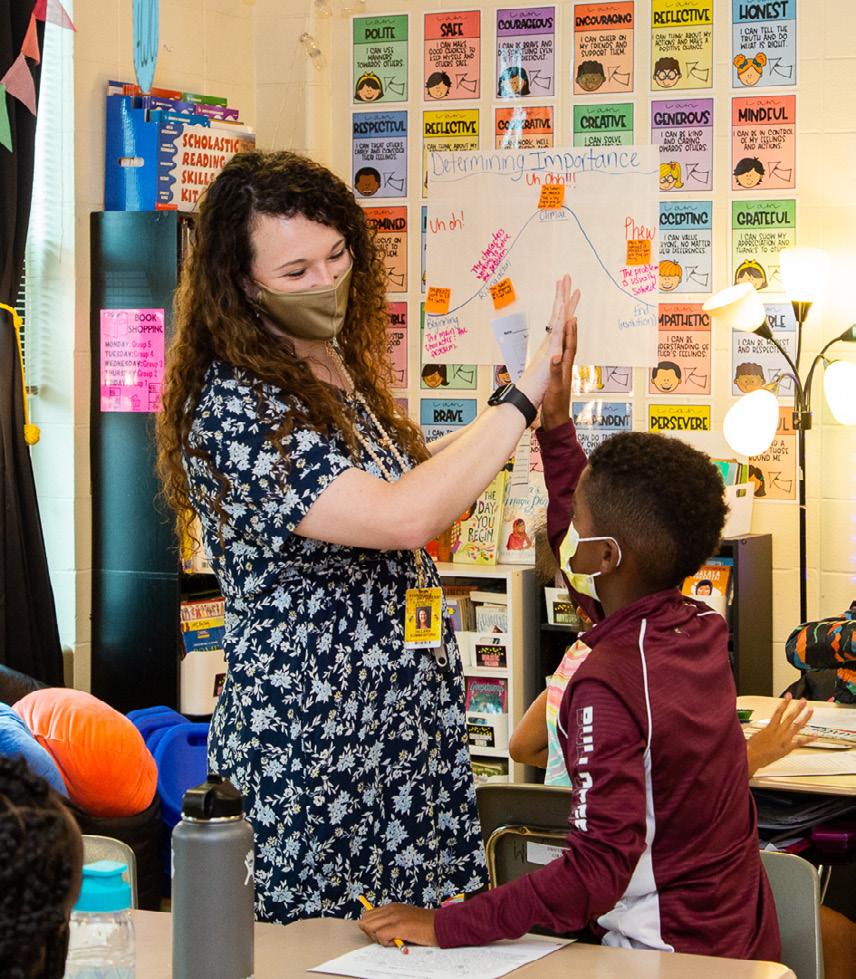
Katelyn Summerford, a third grade teacher at Starkville Oktibbeha School District’s Henderson Ward Stewart Elementary School (HWSES), high fives third grader Max Gordon in the fall semester of the 2021-2022 academic year. HWSES was one of seven campuses named Science of Reading schools by the Mississippi Department of Education for their use of researchbased methods to promote literacy.
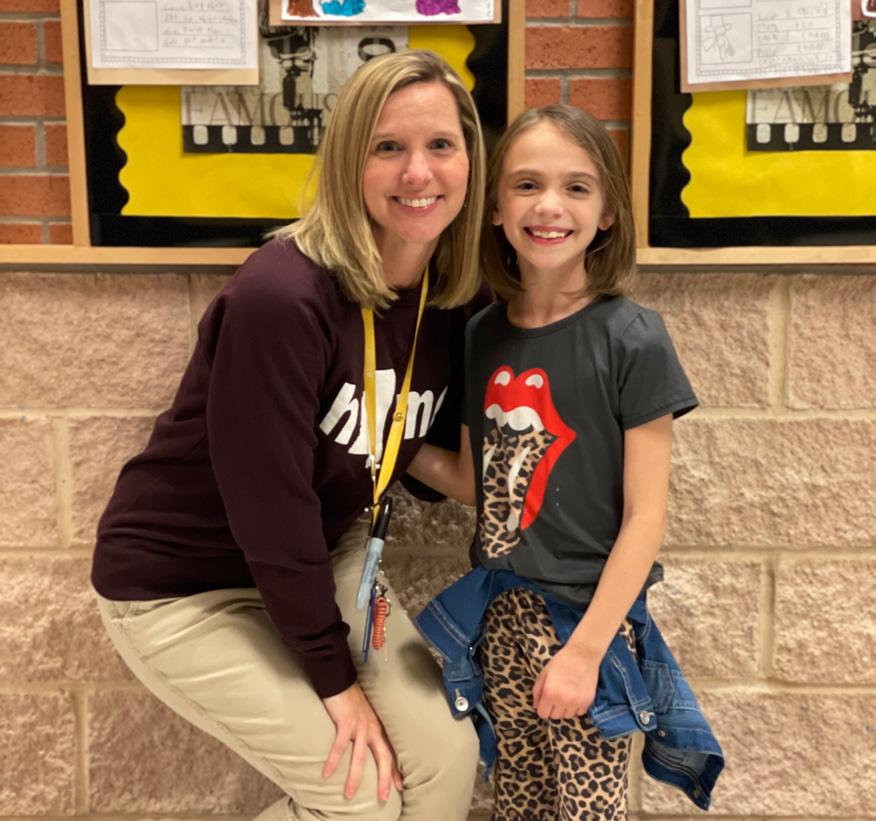
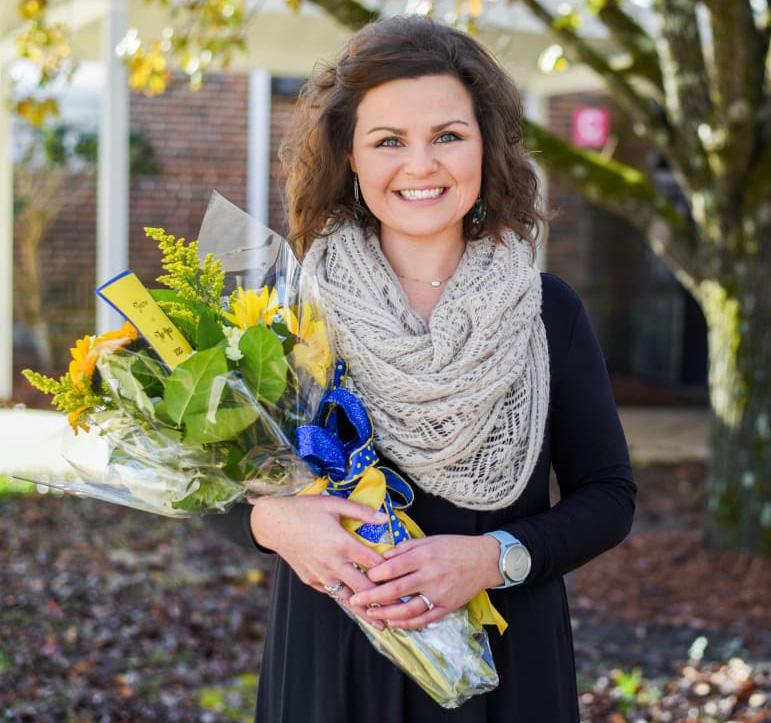
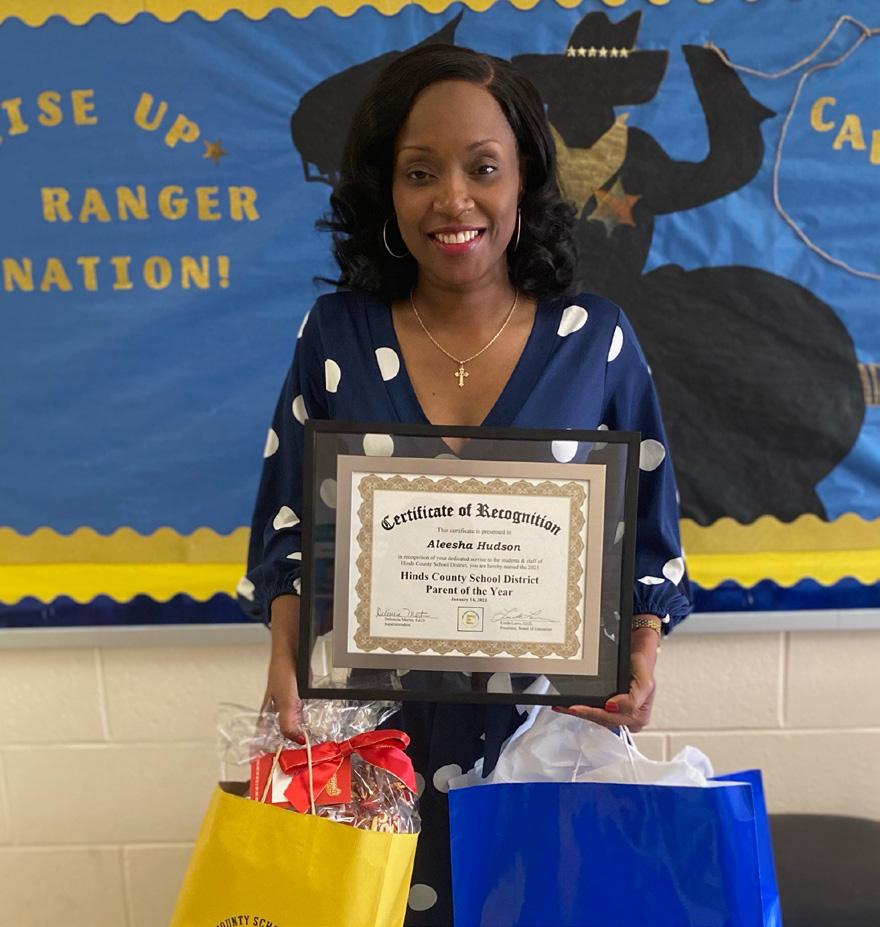
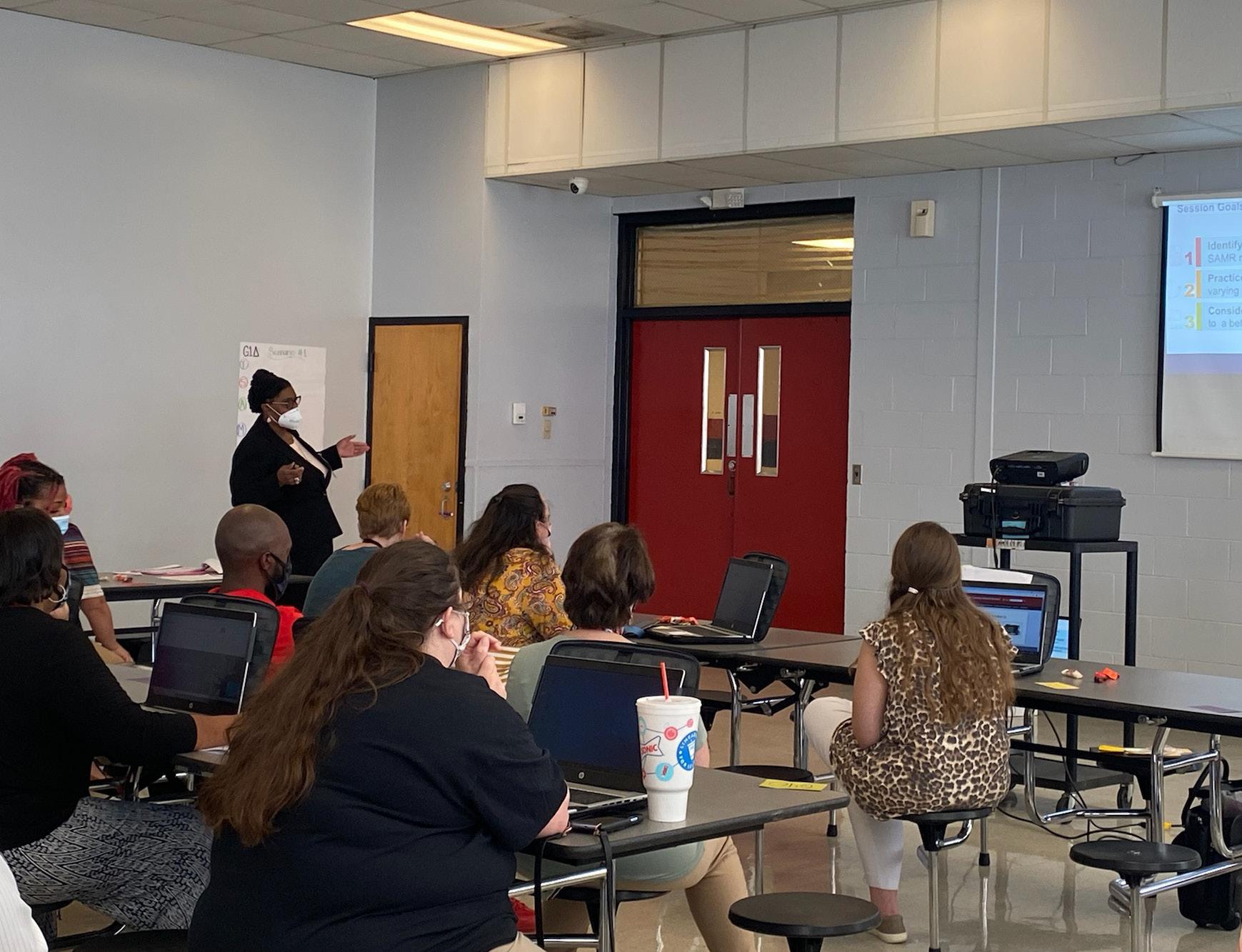
Will Graves
The Mississippi Department of Education (MDE) deployed 20 digital learning coaches across the state at the beginning of the 20212022 school year to bring individualized digital learning support for educators and administrators adapting to virtual instruction.
The digital learning coach program marks the second phase of the Mississippi Connects initiative, which was set into motion by the Mississippi Legislature in
the early days of the COVID-19 pandemic and ensured every student had access to digital learning devices and resources.
Sixty-two schools representing 29 different districts were selected through an application process and have received individualized professional development training and digital learning resources geared toward increasing student outcomes.
With the rollout of Mississippi Connects placing devices in students’ hands, MDE Director of Digital Learning Melissa Banks said it was important to provide teachers with the skills and resources needed to utilize different
types of technology in their classrooms effectively.
“We knew with the quick switch school districts had to make to virtual learning that there were many districts who were just not ready, whether they did not have the devices, infrastructure or connectivity,” she said. “As we were thinking about Mississippi Connects, we knew none of it would be possible without professional development for teachers.”
The digital learning coaches are veteran educators with technology experience who utilize their own experience to help other educators in the field. MDE Digital Learning Coach Lillie Sweazy said upon
Opposite page: Lillie Sweazy, a digital learning coach with the Mississippi Department of Education (MDE), trains Lawrence County School District educators on the best practices of virtual instruction. At the start of the 2021-2022 academic year, MDE deployed digital learning coaches to almost 30 school districts to help teachers transition to online instructional environments through the Mississippi Connects initiative.
selection, coaches began their own professional development to best prepare them to serve their assigned cohorts.
“At the beginning of our tenure we started off by participating in Kennesaw State University’s iTeach program,” Sweazy said. “It was an excellent program that provided us with the training needed to go into the classroom and serve as digital coaches. We were then assigned iTeach coach mentors so we could share our experiences with them, and they in turn provide feedback and resources to assist us with our jobs.”
Often educators may learn of new digital resources available for use in their classroom instruction but lack the guidance on how to use and implement the technology or digital programs to reinforce learning outcomes. Sweazy said digital learning coaches exist to help teachers not only learn about new technologies and education applications, but also to visually model how to use the programs for the benefit of students.
“My job as a digital learning coach has
been a rewarding experience for both myself and for the cohort teachers,” Sweazy said. “I have been able to share and model the digital resources with the teachers to integrate the technology into their classrooms. The good part about the digital learning program is that we are not only introducing and modeling the digital resources, but we are also following up with the teachers to make sure they are comfortable using any resources we present to them.”
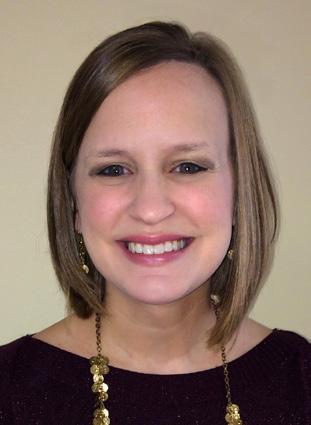
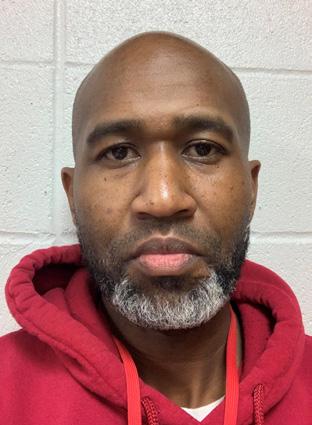
One of Sweazy’s cohorts is at Lawrence County High School (LCHS) in the Lawrence County School District (LCSD). LCHS social studies teacher Patrick Bridges is a participant in the program and said it helped him learn how to implement digital resources to make more relevant, meaningful connections with his older students.
not able to use these resources.”
Through Mississippi Connects, the LCSD became a 1-to-1 district, meaning every student had access to a computer. This was a significant positive outcome for students despite the COVID-19 pandemic, and Bridges said the increased access allowed him more flexibility to include digital learning resources and activities, whether in the classroom or from home.
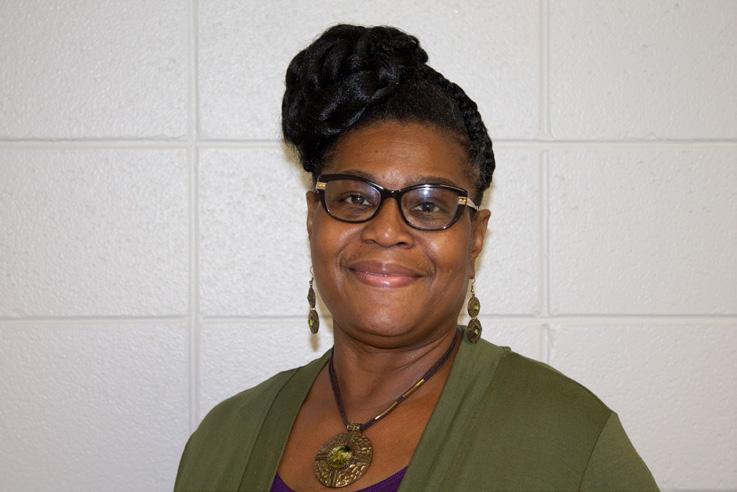
“In teaching history, especially with older students, it can be hard to keep them engaged in the content,” Bridges said. “Instead of the old standard lecture and notes, the PowerPoints I have learned to create and the 3D virtual reality locations I have been able to use have been very helpful. It keeps the students engaged, and, although virtual, they can explore other places they have never seen. Before the digital learning coach program, I was
“Since we have been able to get to 1-to-1 status with our student-to-device ratio, I have been able to assign virtual assignments and activities that can be done online, and the students really tend to favor those types of assignments because they can use computers, tablets and cellphones, which makes the incorporation of these digital teaching resources even more impactful by keeping the students engaged.”
Participating in the digital learning coach program afforded Bridges opportunities to learn about countless online programs and applications that can be used for teaching his history and economics classes, but the most popular activity among his students is using the virtual reality activities in the Nearpod online educational platform.
“My job as a digital learning coach has been a rewarding experience for both myself and for the cohort teachers. I have been able to share and model the digital resources with the teachers to integrate the technology into their classrooms. The good part about the digital learning program is that we are not only introducing and modeling the digital resources, but we are also following up with the teachers to make sure they are comfortable using any resources we present to them.”
- Lillie Sweazy, MDE digital learning coach
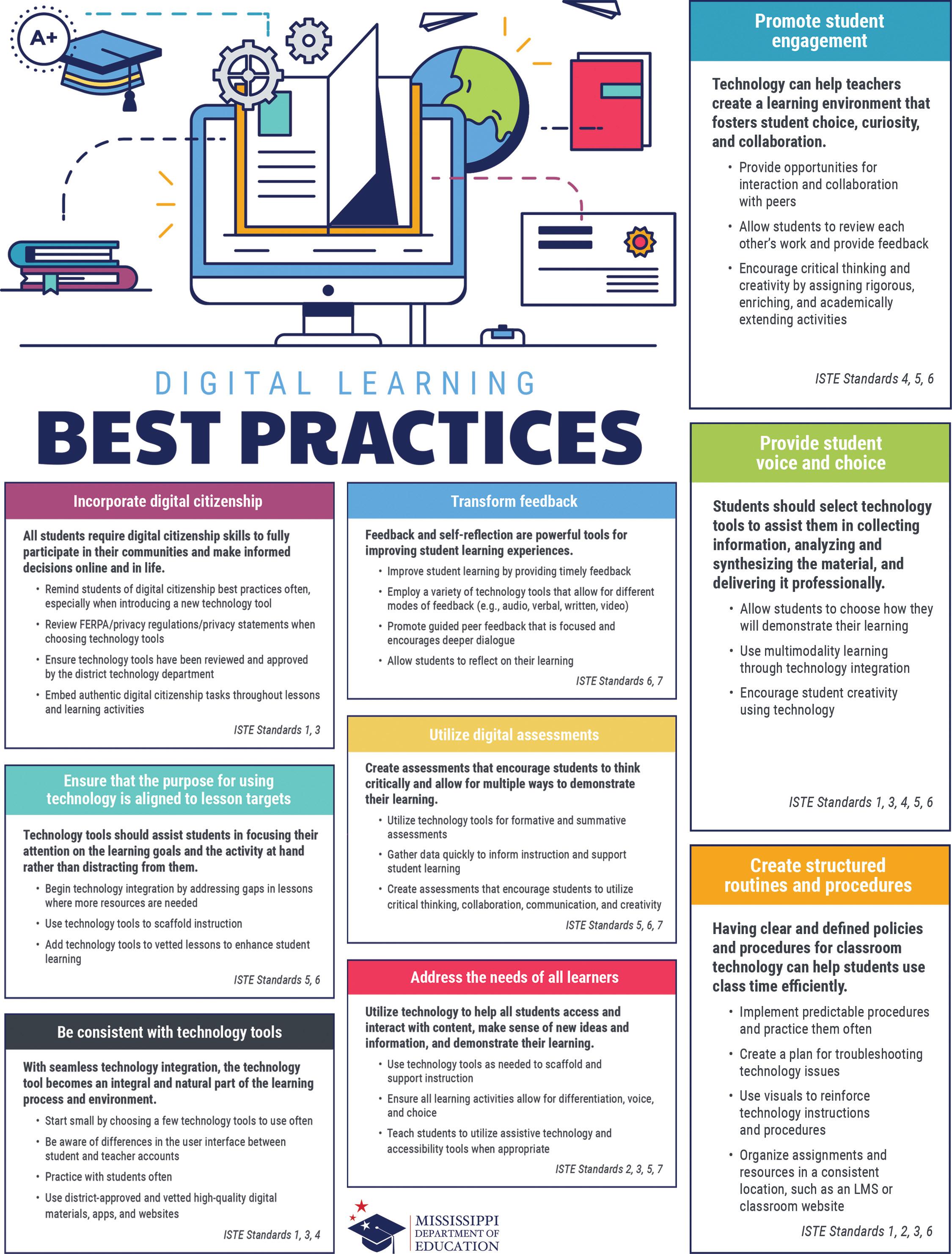
In fact, Bridges said of all the resources he learned about through the digital learning coach program, the diversity of Nearpod and its educational applications and activities have made it the most useful digital classroom tool he has used so far.
“Nearpod allows me to imbed 3D locations and interactive videos within my PowerPoints,” Bridges said. “With these I can show students places in Japan and China, and even the seven wonders of the world. The students are able to visit these places virtually and maneuver around, so the kids get to experience history and
historical places from beyond the pages of a book.”
The digital learning coach program’s emphasis on small-group collaboration in cohorts and instructional modeling and feedback from the coaches helped teachers expand their technology capabilities and brought exciting digital learning activities to students across the state. Reflecting on her experience as a coach, Sweazy said the most rewarding experience from her perspective is seeing teachers’ excitement when they learn about new digital learning resources and how to be successful
using them in the classroom.
“What is so rewarding is helping teachers get connected with programs and activities that are already available that they simply were not aware of,” Sweazy said. “The teachers may not be able to take their students to the zoo, but with technology, they can go to the virtual zoo. Teachers can use so many different interactive games, activities and labs that can be incorporated into lessons they already teach, and it is our mission as digital learning coaches to connect them with these resources.”
Mississippi ranks 35th nationally for K-12 achievement in 2021, climbing from 50th in 2013, according to a fall Quality Counts report published in Education Week.
The report examines achievement in school systems from prekindergarten through 12th grade and socioeconomic factors leading to success in adulthood.
Mississippi earned an overall grade of C- (70.8 out of 100 points), close to the nation’s overall grade of C (76.2 out of 100 points).
raised expectations for what our students can accomplish,” said Dr. Carey Wright, the state superintendent of education. “Other states now look to Mississippi to learn how
on the Quality Counts scale, and only four states improved their score by one point or more: Kentucky (+1.7), Washington (+1.1), the District of Columbia (+1) and Georgia (+1).
The report highlighted Mississippi as one of only four states that closed the achievement gap by more than four points between 2003 and 2019: Illinois (-6.9), Mississippi (-5.4), Nevada (-4.8) and Florida (-4.4).
“Student achievement has been steadily climbing in Mississippi because teachers, school leaders and families have
to improve outcomes for students.”
For the past three years, Mississippi ranked No. 2 for improvement among all states and the District of Columbia. From 2020 to 2021, Mississippi gained .3 points
Mississippi’s most improved ranking was based on the state’s gains on the 2019 National Assessment of Educational Progress (NAEP). Mississippi achieved the No. 1 spot in the nation for gains on the NAEP, known as the Nation’s Report Card. NAEP measures student proficiency in fourth- and eighth-grade reading and mathematics. Mississippi was the only state in the nation to show significant increases in three of the four NAEP subjects. The District of Columbia was the only jurisdiction to show gains in three of four subjects.
The Mississippi Department of Education (MDE) released statewide results from the 2020-2021 Mississippi Academic Assessment Program (MAAP) in September, which provided the first statewide measure of student performance during the COVID-19 pandemic.
For the first time since MAAP tests were first administered in 2016, student proficiency decreased in mathematics and English Language Arts (ELA). Students were last tested in 2019 and reached an all-time high for proficiency in mathematics and ELA.
Statewide proficiency levels fell in all grades except grade 8 ELA, which increased 0.1% (35.6%) since 2019 (35.5%).
MAAP measures students’ progress toward academic goals that equip them with the skills and knowledge they need to succeed in college and the workforce. MAAP measures student performance in ELA and mathematics in grades 3-8 and in high school English II and Algebra I. Mississippi teachers helped develop MAAP tests, which align with the learning goals for Mississippi classrooms.
superintendent of education. “I am proud of the way Mississippi students, families, teachers and school leaders persevered through the most challenging school year of their lives.”
Students had their school year cut short in spring 2020 when
environments to all students, including full-time virtual learners who took assessments at schools. The overall participation rate for assessments was 96.9%, close to the 98-99% rates of previous years.
Due to COVID disruptions, grade 3 students were not required to meet a passing score on the reading assessment to be promoted to grade 4. Students still had to meet all other district requirements for promotion. Students who took required endof-course high school assessments, including Algebra I, English II, Biology and U.S. History, were not required to meet a passing score.
“The disruption and stress caused by COVID-19 has had an impact on student performance in every state in the country and the impact has been more marked in mathematics than in English Language Arts. I am proud of the way Mississippi students, families, teachers and school leaders persevered through the most challenging school year of their lives.”
- Dr. Carey Wright, state superintendent of education
“This year’s statewide assessments provide valuable information about the impact of the pandemic on learning and will help identify where accelerated learning opportunities for students are most needed,” Wright said.
“The disruption and stress caused by COVID-19 has had an impact on student performance in every state in the country and the impact has been more marked in mathematics than in English Language Arts,” said Dr. Carey Wright, the state
the pandemic shut down school buildings in Mississippi and the U.S. Though most Mississippi students had access to in-person learning most of the 2020-2021 school year, hybrid learning, quarantining and numerous weather-related school building closures created obstacles to teaching and learning.
The MDE provided districts pandemic-related flexibilities to administer the assessments. Schools provided safe testing
Though overall statewide proficiency levels dropped, proficiency levels did not drop in every grade, subject and school. Notably, Ocean Springs School District (OSSD) improved its districtwide ELA proficiency level since 2019.
“For our students to show continued growth and improved proficiency during such a difficult time in their lives is such an outstanding accomplishment,” said Dr. Bonita Coleman, superintendent
of OSSD. “Continuing the learning path for all of our students and ensuring no student’s learning is negatively impacted during this unprecedented time has been of the utmost priority for OSSD. We are thankful for all of our dedicated educators and students who helped ensure a worldwide pandemic did not stand in the way of our continued progress.”
Pre-pandemic, statewide student proficiency rates increased every year since MAAP tests were first administered. By 2019, Mississippi had become a national leader in education because students were making faster progress than nearly every other state. Several factors contributed to the steady rise in student achievement, including the implementation of higher academic standards and statewide support to teachers to help students reach higher standards.
“This year establishes a
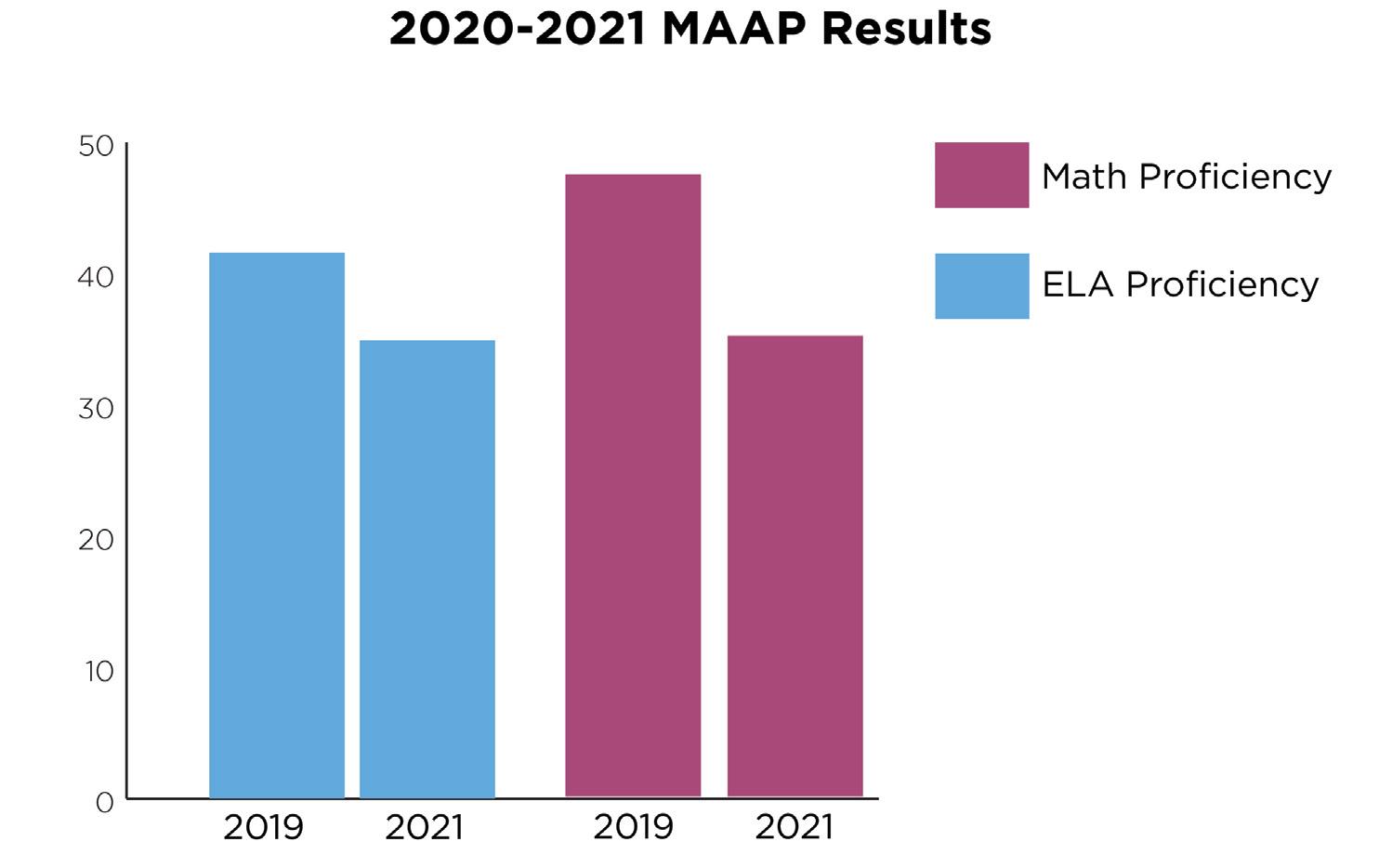
new baseline for statewide assessments,” Wright said. “As the world moves to recover from the pandemic, I am confident Mississippi students will progress just as rapidly as they did before.”
2020-2021 district- and school-level
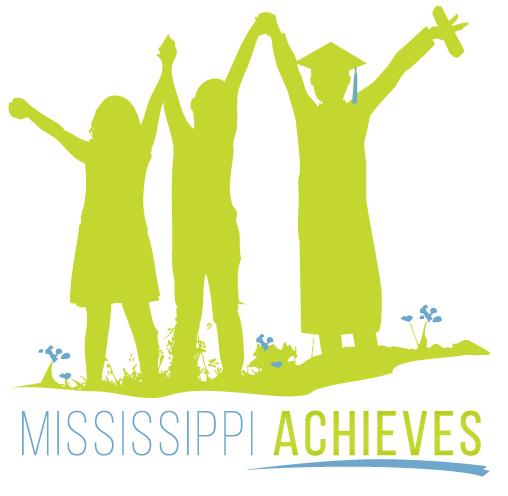
assessment results: mdek12.org/OPR/Reporting/ Assessment/2020-21
2018-2019 district and school-level assessment results mdek12.org/OPR/Reporting/ Assessment/2018-19
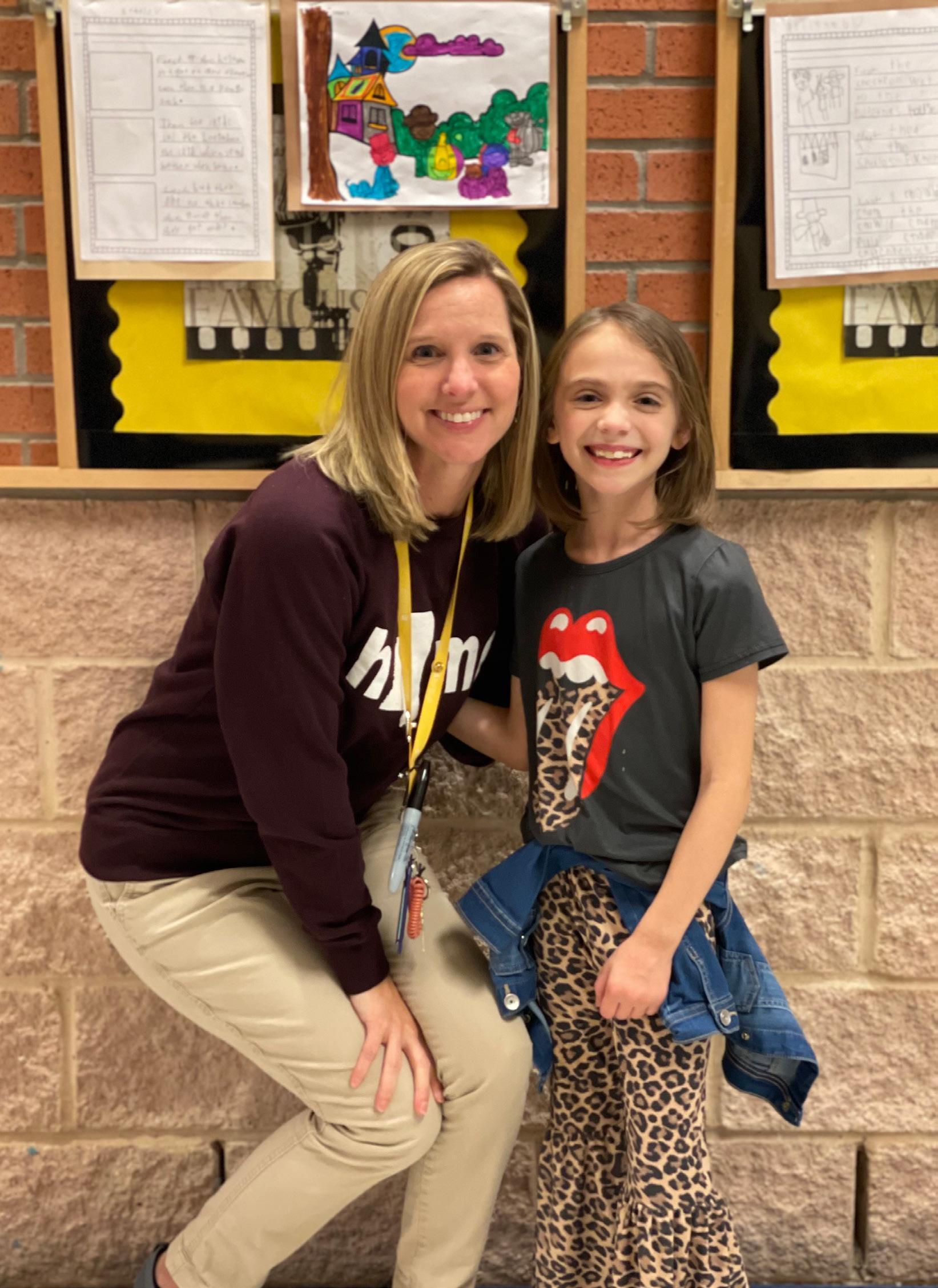
Brock Turnipseed
“Home is where the heart is.”
This famous quote accurately describes Mandy Lacy’s career in education. She first walked into Pass Christian Public School District’s DeLisle Elementary School (DES) in 2002 as a second grade teacher. Twenty years later, she still walks the same halls as the school’s principal.

Having been inside the four walls of a classroom for two decades, she knows the daily support teachers and students need.
Mississippi emphasizes social emotional learning for students, but Lacy also emphasizes her teachers’ own social and emotional needs.
“If we’re not supporting them and helping them feel like this is a good place to be, then why wouldn’t they want to go somewhere else? We need to support them in any way we can in the classroom. They need support just as much as the kids do,” she said.
For Lacy, supporting her teachers creates learning environments in which students feel valued. This focus on social and emotional support for her teachers and students earned her 2021 Mississippi Administrator of the Year (MAOY) from the Mississippi Department of Education and the Office of Teaching and Leading.

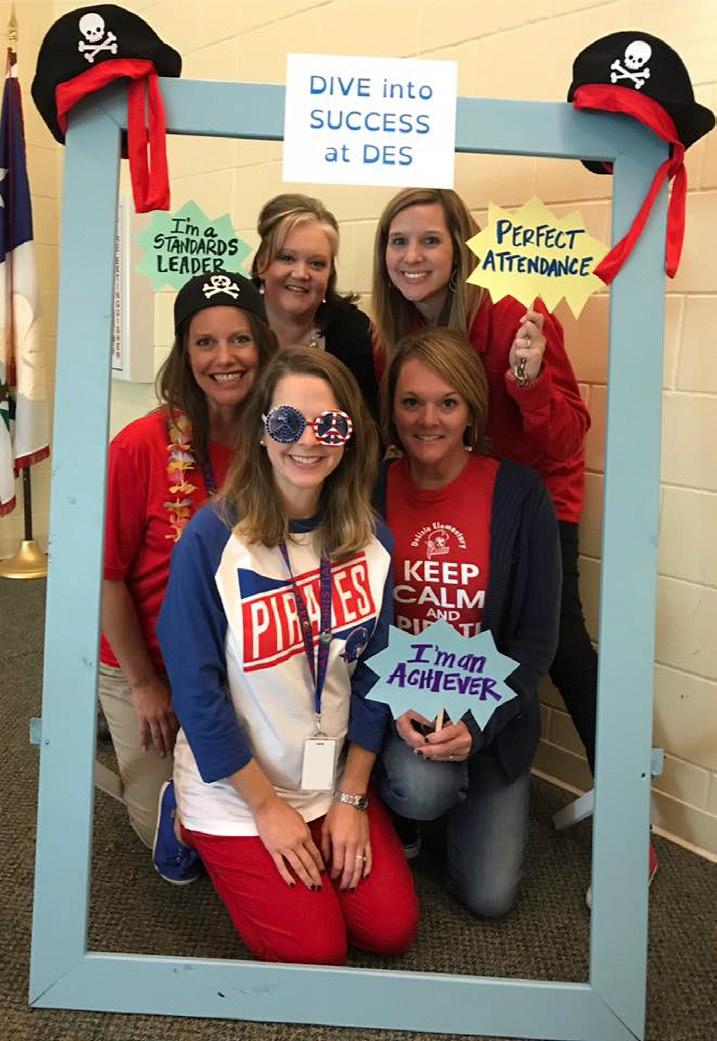
Opposite page: DeLisle Elementary School third grader Lena Brown (right) poses for a photograph with Mandy Lacy, the school’s principal and the 2021 Mississippi Administrator of the Year. Lacy has worked at the school for 20 years, including serving as the principal since 2017. She helped raise the Pass Christian Public School District school to an A rating in the Mississippi Accountability Report and prioritizes the social and emotional needs of her students and teachers.
Lacy has her teachers fill out a survey based on the book “The 5 Languages of Appreciation in the Workplace” at the start of the school year to determine what acts of appreciation her teachers need, such as words of encouragement or acts of service.
Acts of service are part of Lacy’s appreciation language, which is not a surprise since she considers herself a coteacher along with her staff.
“I haven’t forgotten what it’s like to be in the classroom, so I want to do whatever I can to make my teachers’ jobs easier so they can provide high-quality, standardsbased instruction,” she said. “We want our children to say, ‘I get to go to school today,’ not ‘I have to go to school today.’ The only way our children can get to that point is if our teachers feel the same way, so my goal is to create an environment where teachers choose to come here.”
Education has been Lacy’s calling since she taught teddy bears, dolls and anyone who would listen when she was a child. A brief detour as an accounting major at the University of Southern Mississippi helped solidify that calling, so she switched to elementary education.
Lacy taught at DES for six years before realizing her calling was “beyond the four walls of one classroom.” After earning a master’s degree in educational administration, she moved into an interventionist position and later a lead teacher role at DES. The lead teacher position changed to assistant principal, in which she stayed for seven years until the principal’s job opened.
Margaret Pavolini, a fourth grade science and social studies teacher at DES since 2010, said Lacy “pours her heart and soul” into her calling.
“She always makes time for you, and when she’s speaking to you, you’re most important. She does an excellent job at anything she chooses to take on,” Pavolini said.
When she took over as principal, DES had a B rating in the Mississippi Accountability Report, 25 points from
an A. She implemented the Strive for 25 campaign and had lanyards and buttons made for teachers and stickers for students. She also helped the teachers understand the method for calculating the accountability model.
“Once they could see that [an A] was within reach, it helped give that extra push,” Lacy said.
The school’s score increased by 74 points, and DES remains an A-rated campus. Lacy said some teachers still wear the button as a reminder they’re never too far away from their next goal.
To reach higher goals, Lacy recognized the school community should know her school’s mission. That is why this year, she launched a set of core values under the acronym GEARS — grit, equity, accountability, respect and safety.
Pavolini said the school’s counselor teaches character classes based on those core values.
She also noted Lacy worked with the counselor to obtain one of 82 kindness grants awarded nationally. Educators choose a kindness crew to serve as ambassadors for the school. That crew hosted a community event and painted encouraging messages on rocks they gave to teachers and friends to show appreciation.
“We have shown that [kindness] is something we really value in our students,” Pavolini said.
Pavolini and her fellow teachers recognize Lacy’s “100% dedication” to DeLisle and said, “she wouldn’t ask us to do anything she wouldn’t do.”
While the award recognizes her work in the school, Lacy said her staff deserves all the credit.
“I can’t say enough about my staff here,” she said. “I definitely feel like this is an honor geared more toward them than myself. They certainly deserve all the recognition as well.”
Seniors Emily Adcock and Vaibhavi Mahajan joined Sens. Roger Wicker and Cindy Hyde-Smith in representing Mississippi during the 60th annual United States Senate Youth Program (USSYP) Washington Week March 6-9.
Adcock, of Madison, and Mahajan, of Brandon, were selected from among the state’s top student leaders to be part of a 104-student delegation and will each receive a $10,000 college scholarship for undergraduate study. Due to the ongoing pandemic, the 2022 program was held online through a comprehensive and highly interactive virtual education and leadership forum.
The USSYP was created in 1962 and has been sponsored by the Senate and fully funded by the Hearst Foundations since inception. The impetus for the program as stated in Senate testimony is “to increase young Americans’ understanding of the interrelationships of the three branches of government, learn the caliber and responsibilities of federally elected and appointed officials and emphasize the vital importance of democratic decisionmaking not only for America, but also for people around the world.”
Each year this extremely competitive merit-based program provides the most outstanding high school students — two from each state, the District of Columbia and the Department of Defense Education Activity — with an intensive week-long study of the federal government and the people who lead it.
The overall mission of the program is to help instill each class of USSYP student delegates with more profound knowledge of the American political process and a lifelong commitment to public service. In addition to the program week, the Hearst Foundations provide each student with a $10,000 undergraduate college scholarship with encouragement to continue coursework in government,
history and public affairs. All expenses for Washington Week are also provided by the Hearst Foundations.
Adcock, who attends Madison Central High School (MCHS), serves as the secretary of the Beta Club. She is a National Merit semifinalist, the color guard captain for the marching band and a delegate for the Mississippi Youth Legislature. An alumna of the Hugh O’Brian World Leadership Congress, she also sits on Madison’s Youth Council. At MCHS, she is president of the Jag Buddies Club and a member of the National Honor Society, Women’s Empowerment Club, Advocates for Change and the symphonic band. Her community service consists of projects through her church, Beta Club, National Honor Society and Jag Buddies. She plans to major in public health with minors in English and public policy, ultimately hoping to study law and craft health care policy.
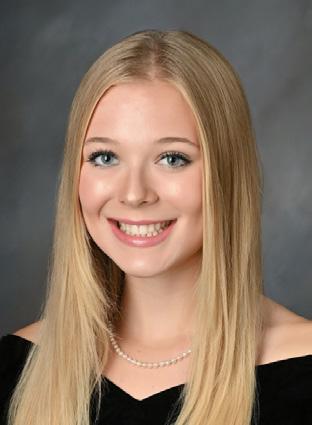



Mahajan, who attends Northwest Rankin High School (NWRHS), has served as class copresident all four years in student government. Additionally, she serves as president of Beta Club, National English Honor Society and Model U.N. She is vice president of the National Honor Society and DECA, an organization focused on entrepreneurship, and serves in many other organizations in school. She is a Mississippi Children’s Museum volunteer and established a free student-led ACT workshop for her school. She is a National Merit semifinalist and has been designated an Amazing Teen by the Jackson Free Press. This past summer she was elected secretary of state at Magnolia Girls State
and was chosen as one of the two Mississippi senators to Girls Nation. Mahajan plans to attend Georgetown University to study international affairs, which will prepare her to serve as an ambassador for the U.S., and one day secretary of state.
Amy Zhang, a resident of Starkville who attends Mississippi School for Mathematics and Science, and Albert Curry, a resident of Brandon who attends NWRHS, were chosen as alternates for the 2022 program. Zhang is also the current senior student representative to the Mississippi State Board of Education.
Delegates and alternates are selected by the state departments of education nationwide and the District of Columbia and Department of Defense Education Activity, after nomination by teachers and principals. The chief state school officer for each jurisdiction confirms the final selection.
This year’s Mississippi delegates and alternates were designated by Dr. Carey Wright, the state superintendent of education.
During the program week, the student delegates attend online meetings and briefings with senators, the president, a justice of the Supreme Court and leaders of cabinet agencies, among others. In addition to outstanding leadership abilities and a strong commitment to volunteer work, the student delegates rank academically in the top 1% of their states among high school juniors and seniors.
The Mississippi Department of Education (MDE), through its Mississippi Teacher Residency (MTR) program, is awarding $9.88 million in grants to five universities in the state to cover tuition and expenses for up to 240 individuals seeking a graduate degree in elementary and secondary education.
The MDE is using American Rescue Plan Elementary and Secondary School Emergency Relief funds to cover the grants.
The MTR will provide grants to the universities’ educator preparation programs to enroll diverse participants to work toward their graduate degree and Mississippi teacher certification. MTR will include training alongside a mentor teacher, testing support, professional development, ongoing assessment and a commitment to teach in a geographical critical shortage school or district serving low-income children, racial/ ethnic minorities and children with disabilities disproportionately impacted by COVID-19.
The universities receiving grant funding are Delta State University, Jackson State University, Mississippi State University, the University of Southern Mississippi and William Carey University.
Individuals accepted into the MTR program will receive full scholarships, testing fees, books and mentor stipends. Applications will be available on MDE’s website by April.
MTR is one of the state’s strategies to address the national teacher shortage. A fall MDE survey to assess educator shortage showed there are 3,036 certified teacher vacancies in Mississippi.
Due to the COVID-19 pandemic and closure of testing sites for licensure examinations in March 2020, the Mississippi State Board of Education temporarily waived many of the licensure exam requirements for new teachers and test score requirements for students entering teacher preparation programs.
Data indicate the waivers for program entry contributed to an overall 143% increase in the total number of students entering teacher preparation programs. The waiver period from March 2020 through the summer of 2020 was a major factor in more than doubling the number of admitted candidates from 1,427 in 2018-2019 to 3,468 in 2019-2020.
MDE’s Office of Teaching and Leading has operated MTR since 2018 to increase the number of qualified teachers entering
and remaining in the profession. The project is funded by a $4.1 million grant from the Kellogg Foundation. MTR is part of a statewide strategy to expand and diversify the teacher pipeline, so all students have teachers who are wellprepared, appropriately licensed and able to serve as role models.
In previous years, MTR was available to undergraduate and graduate students, resulting in 85 participants so far, 17 of whom have graduated and received their teaching license. The program has also assisted up to seven provisionally licensed educators to become fully licensed. When surveyed recently, 87% of MTR mentor respondents indicated that their assigned residents would be prepared to assume lead teaching responsibilities upon graduation.
“At MDE we are committed to developing more effective teachers particularly for critical areas in Mississippi,” said Dr. Carey Wright, the state superintendent of education. “We are delighted to collaborate with these five universities to not only eliminate students’ financial costs for a graduate degree, but also equip potential educators with necessary tools inside and outside of the classroom.”
Mississippi State University
University of Southern Mississippi
William Carey University
Total Per Year
$951,463.20
$1,019,294.82 $1,017,568
$1,019,917 $929,003
$4,937,246.02
$951,463.20 $1,019,294.82
$1,019,012
$1,019,909 $939,543
$4,949,222.02
$1,902,926.40 $2,038,589.64 $2,036,580 $2,039,826 $1,868,546 $9,886,468.04
Veteran Gulfport High School (GHS) math teacher Scott Wedgeworth’s teaching mantra is simple: “I’m a ‘Here’s the example of when this really happens’ teacher.” That mantra is why it’s not uncommon for an engine from the local shop to be used as a teaching tool in his class.
Wedgeworth, who teaches within the school’s science, technology, engineering and mathematics (STEM) academic institute, said using physical implements like engines allows students to better grasp — literally and figuratively — mathematical concepts in a way that provides real insight into what they’re learning.
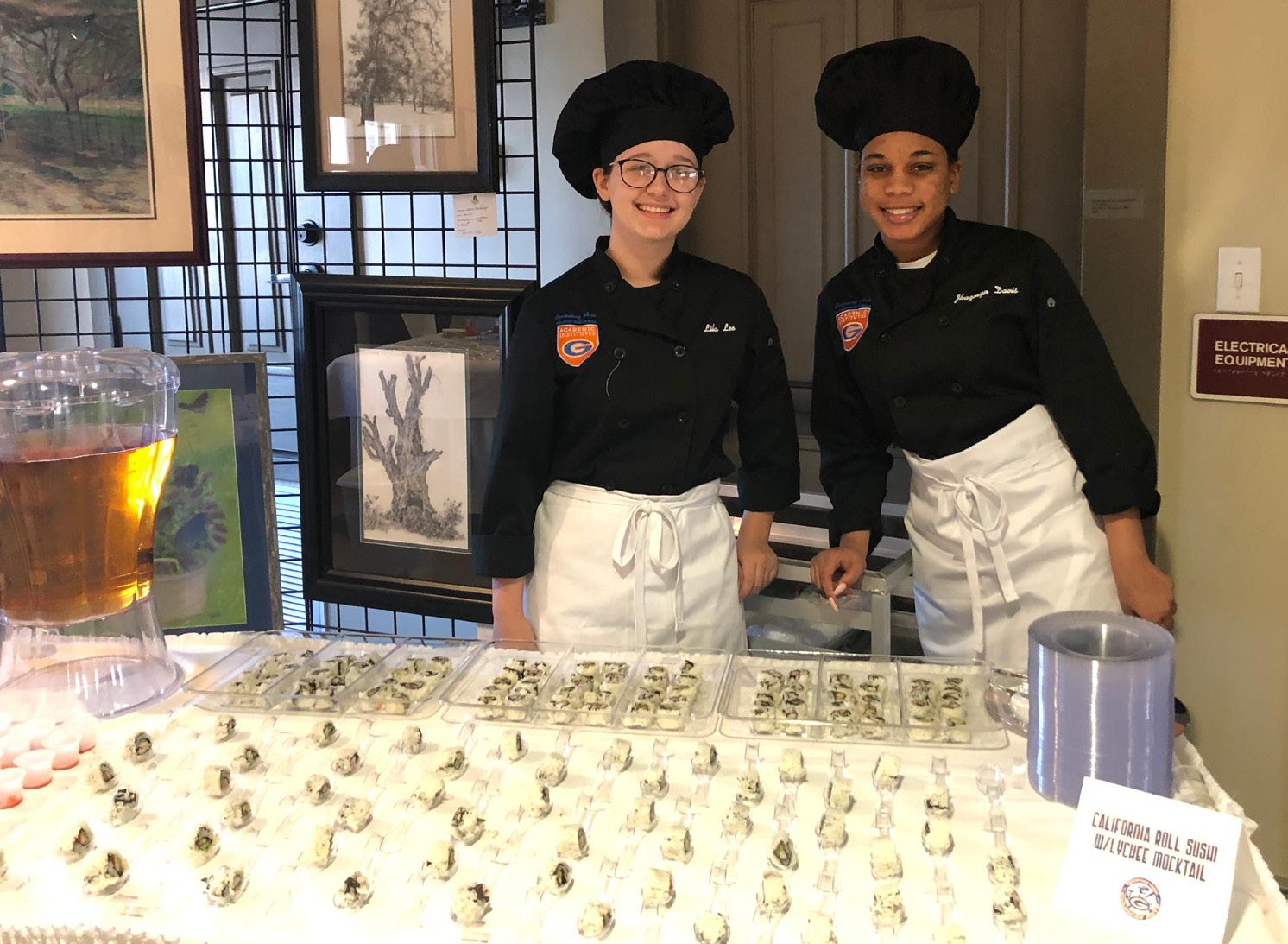
Two Gulfport High School (GHS) culinary arts students pose with California roll the class made for an event. Culinary arts is part of the communication, arts and business (CAB) academic institute at GHS, and academic institutes are the school’s take on the career academy model that blends traditional academic classes with career and technical education (CTE) elements.
“I’ll point at it and say to my students, ‘Do you see this? This is what a cylinder looks like. Guess what? In calculus, we can find the volume of that cylinder. Now, let’s go learn that formula,’” he said. “It’s not that every student will become a professional automotive technician, but it’s … training the way the brain functions, getting them to think more critically and applying those things to realworld examples. Those examples are what I love to do.”
Many schools across Mississippi are utilizing the career academy model to create tailored instruction that prepares students for both college and career by blending traditional academics — basic math or English classes, for example — with career and technical education (CTE) elements. Academic institutes, Gulfport’s take on the career academy model, delivers classes and instruction aligned to
“What we’ve done with [the career academy model] is we’ve figured out how to integrate all of these important things into every lesson every day. When we talk about alignment, we’re not joking around. In reality, what we’re doing is proving to the kids that every standard in academics is absolutely necessary in order to get a job and be successful in the future.”
- David Cress, MDE director of career academies and innovative programs
three career clusters: communication, arts and business (CAB); health and human services (HHS); and STEM.
Teachers within the GHS institutes and other career academies across the
state continuously collaborate when developing lesson plans, which allows the educators to thread common topics across a variety of classes. David Cress, who helps develop innovative programs for the Mississippi Department of Education (MDE), uses an example of how an English class reading “Pixar Storytelling: Rules for Effective Storytelling Based on Pixar’s Greatest Films” could highlight CAB students’ needs.

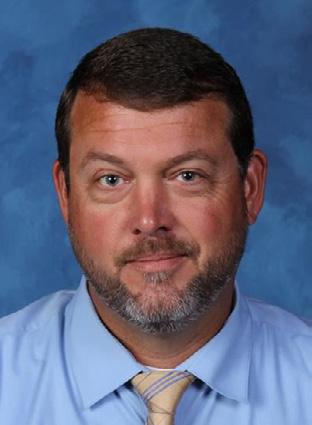
“If [students] are reading that story, not only are they learning English standards, but they’re also learning about the business and history behind moviemaking, linear editing versus nonlinear and so forth,” he said. “They’re doubling, tripling and even quadrupling the total amount of knowledge and standards they’re learning.
“What we’ve done with [the career academy model] is we’ve figured out how to integrate all of these important things into every lesson every day. When we talk about alignment, we’re not joking around,” Cress added. “In reality, what we’re doing is proving to
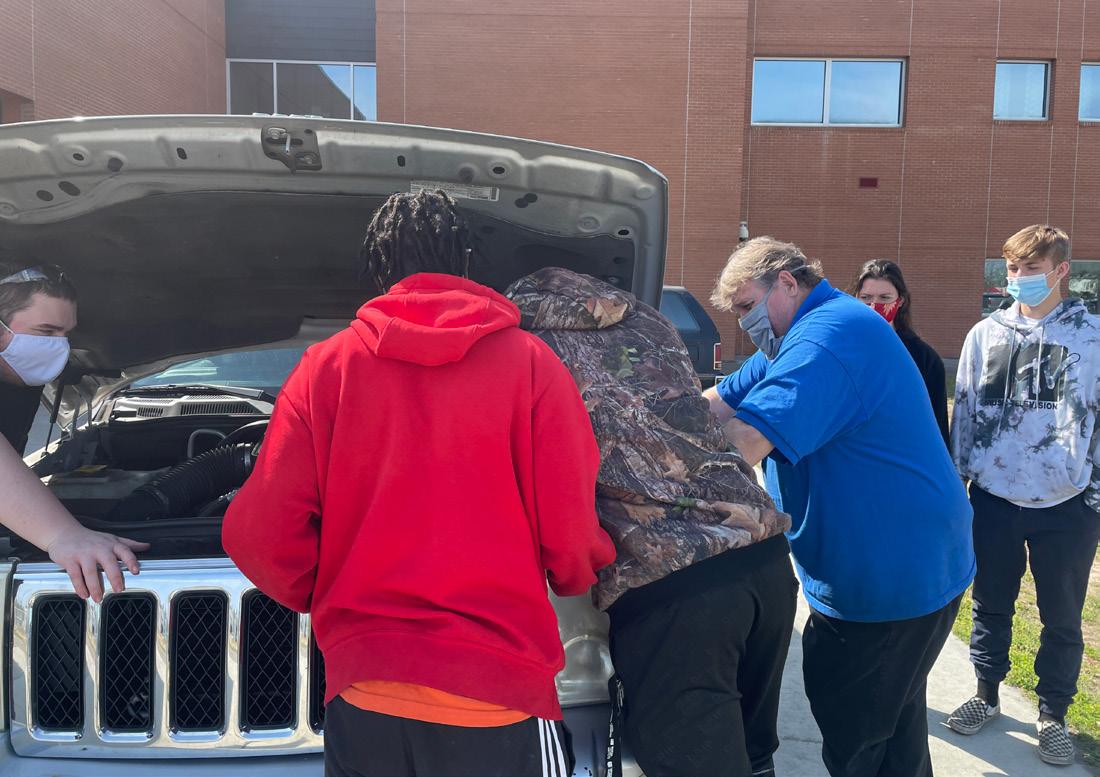
the kids that every standard in academics is absolutely necessary in order to get a job and be successful in the future.”
‘A natural fit’
Gulfport’s success in implementing its version of the career academy model is due to many deliberate steps. District leaders made moving to the system a priority in long-term planning, and a bond issuance funded a redesign of the high school campus that intentionally placed CTE classes alongside their more traditional brethren. Gulfport School District (GSD) also received District of Innovation status from the MDE, and GHS administrators retooled class blocks to a five-by-five structure, thereby allowing students to capture more credits in their freshman and sophomore years.
“Many of our students were then coming to their junior years with nearly what they needed to graduate,” said Dr. Tom Wallace, the high school’s CTE director, “so then the focus changes
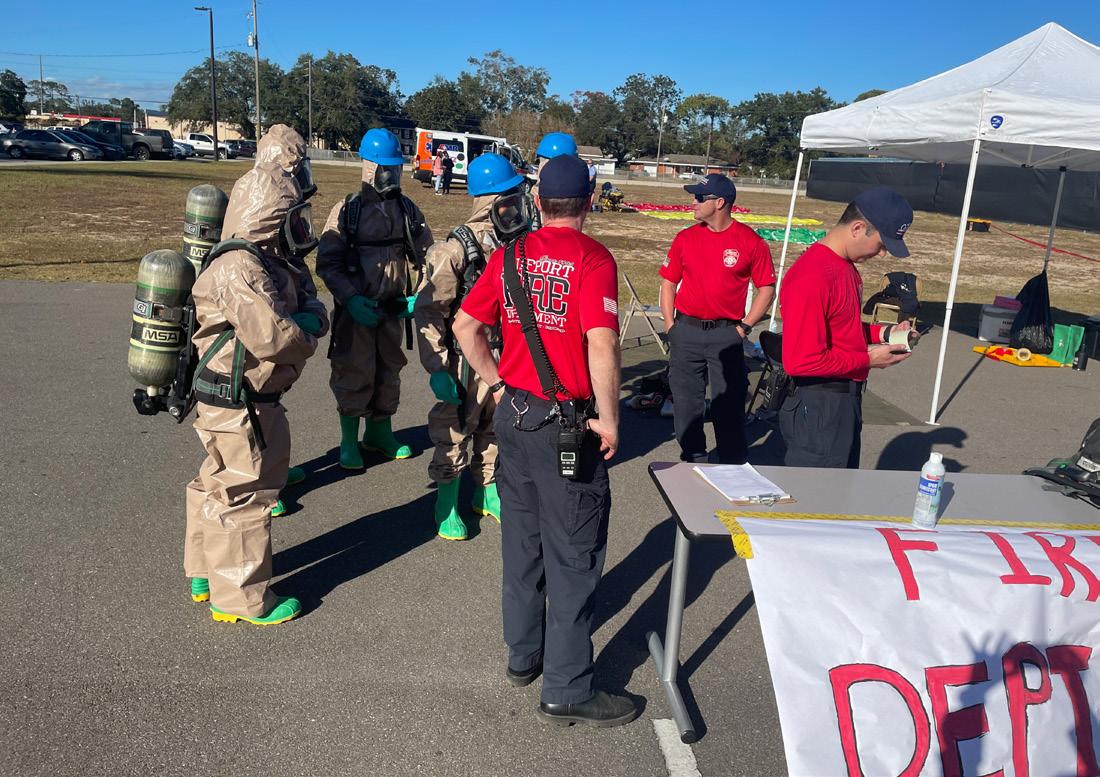
from ‘What do I need to graduate?’ to ‘What am I going to do as a career?’ and ‘Am I going to college or am I going to the workforce straight out of high school?’ It then becomes a natural fit to plug and play them into CTE courses or academic courses slanted toward workforce building.”
Aliya Puryear is the definition of a well-rounded student thanks to GHS.
All three academic institutes have shaped her education: She’ll graduate with credits in Auto Mechanics, AP Physics and AP Calculus from the STEM institute; she took numerous HHS institute science classes in preparation for college; and she serves as vice president of the school’s DECA chapter, which falls under the CAB umbrella, and as a member of the school’s student ambassador program.
“This may seem like a very undecided way to explore our CTE courses, but I chose to be a part of each institute for very specific reasons. My involvement in the STEM and HHS institutes really developed my love of mathematics and science, and they are a big part of my aspirations to become a biomedical engineer. My involvement with DECA, as well as the student ambassador program,
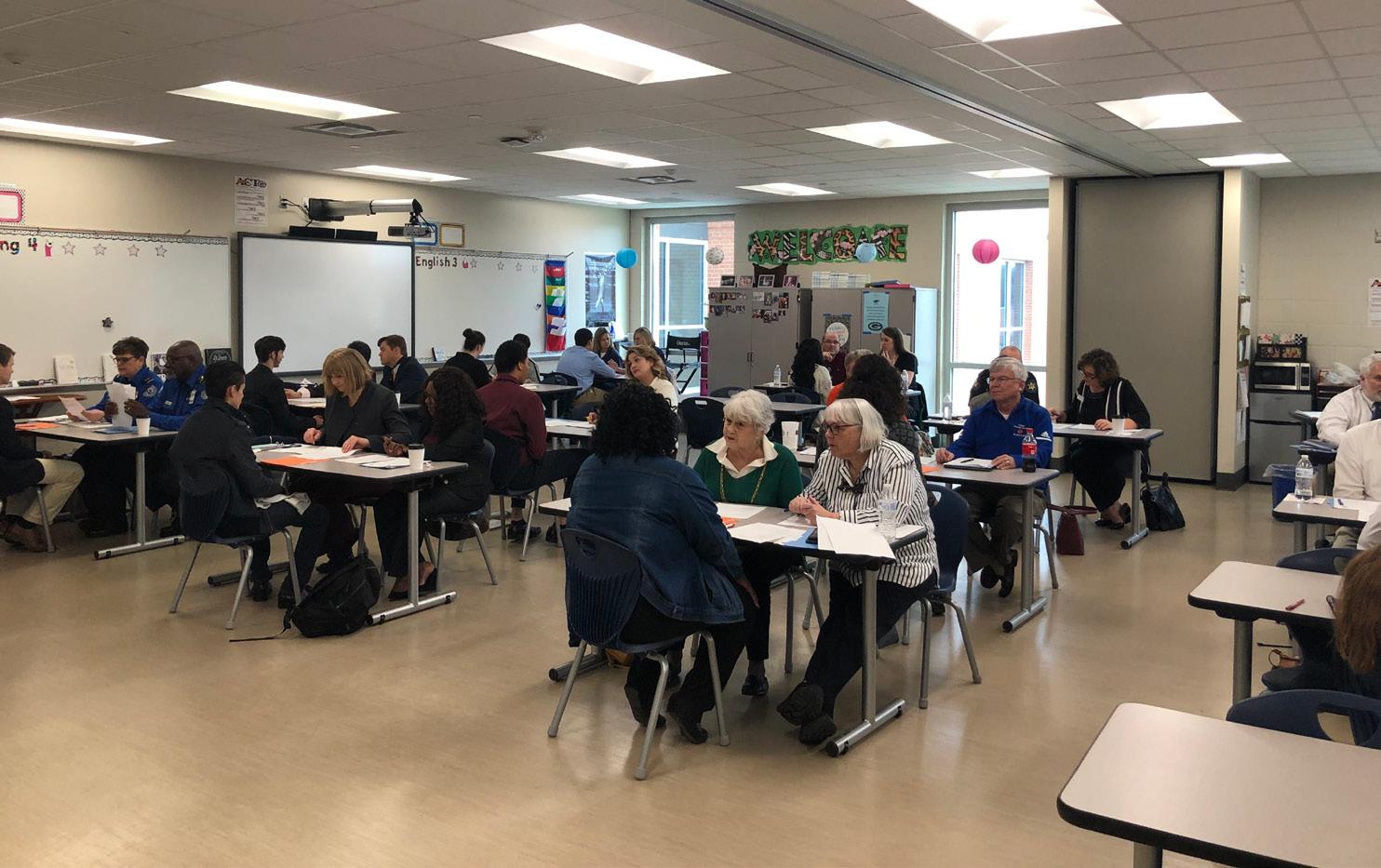
Community members and business leaders interview GHS students during the school’s annual Rising Stars event. The event helps prepare seniors as they begin emerging into the workforce by developing their interviewing and networking skills.
has fostered my communication and leadership skills. My experience with all three of the institutes has given me lifelong connections and skills that are indispensable,” she said. “[GHS] has provided me with a unique experience I do not believe I would have gotten in a traditional classroom. The best part about tying in academic studies with real-world concepts and industry is that it provides us with a pipeline into the real world and gives us an in-depth and hands-on look at what we could be doing in our future. Because of these institutes, I feel that I am beyond
prepared for whatever is thrown at me next in both my professional and personal life.”
But what was one of Puryear’s coolest institute experiences? Learning about physics concepts by shooting potatoes across the school’s parking lot.
“It gets no better than this,” she said.
As a sophomore, Luke Simpson was allowed to join the STEM institute a year early because of his membership with the school robotics team. From working on a robot for the Gulfport SWAT team to developing an automated oyster
My experience with all three of the institutes has given me lifelong connections and skills that are indispensable. [GHS] has provided me with a unique experience I do not believe I would have gotten in a traditional classroom. The best part about tying in academic studies with real-world concepts and industry is that it provides us with a pipeline into the real world and gives us an in-depth and hands-on look at what we could be doing in our future. Because of these institutes, I feel that I am beyond prepared for whatever is thrown at me next in both my professional and personal life.”
- Aliya Puryear, Student at Gulfport High School
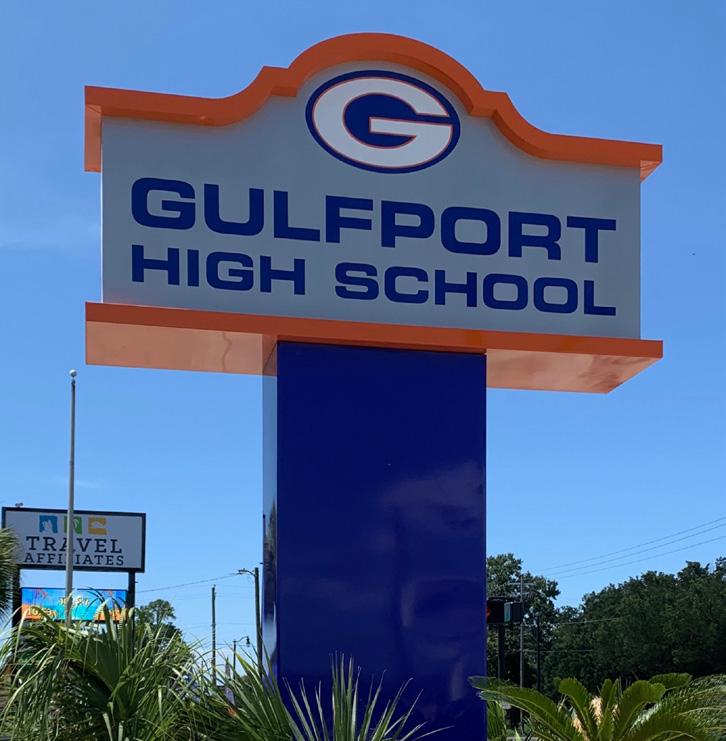
The GHS sign is pictured. Dr. Tom Wallace, the school’s CTE director, said Gulfport School District’s leadership took deliberate steps toward adopting the career academy model, including utilizing a school bond to redesign the GHS campus so traditional classrooms were built next to CTE shops and learning spaces.
cultivation system for the Mississippi Department of Marine Resources, Simpson, now a senior, said the STEM institute afforded him experiences not offered by traditional engineering classes.
“The culmination of … engineering curricula and real-world work experiences provides a way of teaching like no other,” said Simpson, who is expected to graduate with an associate degree along with his high school diploma. “The Institutes at Gulfport High School helped to shape my outlook on my future career and developed a deeper passion for the STEM field.”
From the design of its campus to teachers showing students how they can apply theory to the real world, both Cress and Dr. Aimee Brown, the state’s former CTE director, said Gulfport’s academic institutes are succeeding because of the intentionality and purpose behind the district’s educational goals.
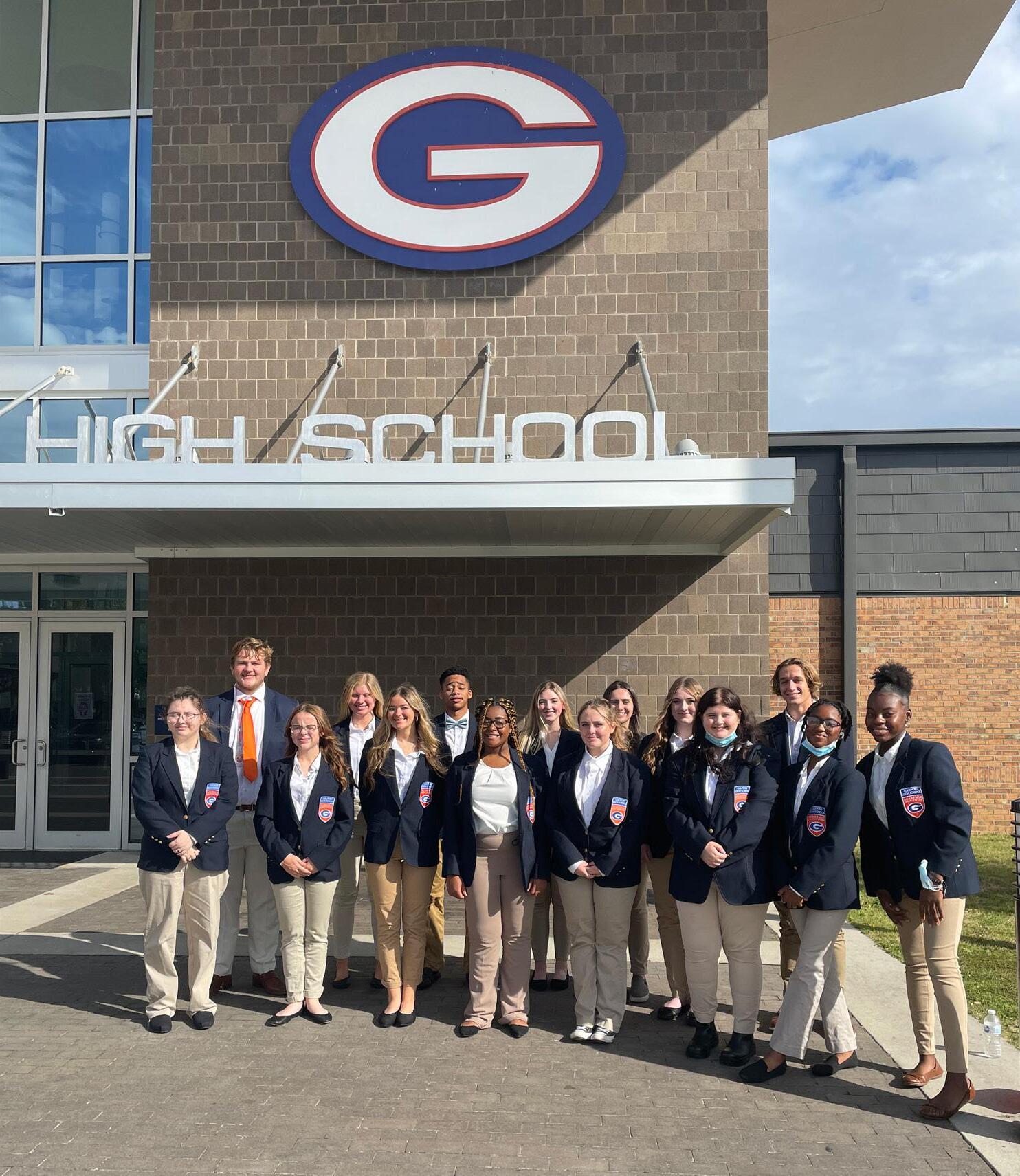
GHS student ambassadors pose outside the high school. Aliya Puryear, a GHS senior, said her experiences serving as an ambassador and with classes and groups within all three academic institutes gave her “lifelong connections and skills that are indispensable.”
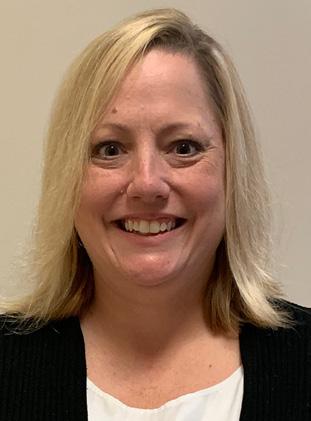
Brown
“It’s all about that purpose. They really embraced the comprehensive high school model; they built their facilities intentionally to accomplish that goal; they support their teachers; and they have great buy-in from the local community,” Brown said. “[GSD Superintendent] Glen East quickly identified what he wanted to accomplish and how, and he designed a strategic plan to make it happen. They’ve had strong leadership and strong support from business and industry, and it’s really paying off in terms of outcomes for our students there.”
Those outcomes, Brown said, are students are more likely to stay in school, graduate and then start a career in the area they’ve been trained.
“One hundred percent of what we’re trying to do is focused on student outcomes,” Cress said. “What happens with student engagement [in the career academy model]? It increases. Understanding the whys and hows of the world is the motivation that pushes students to do better.”
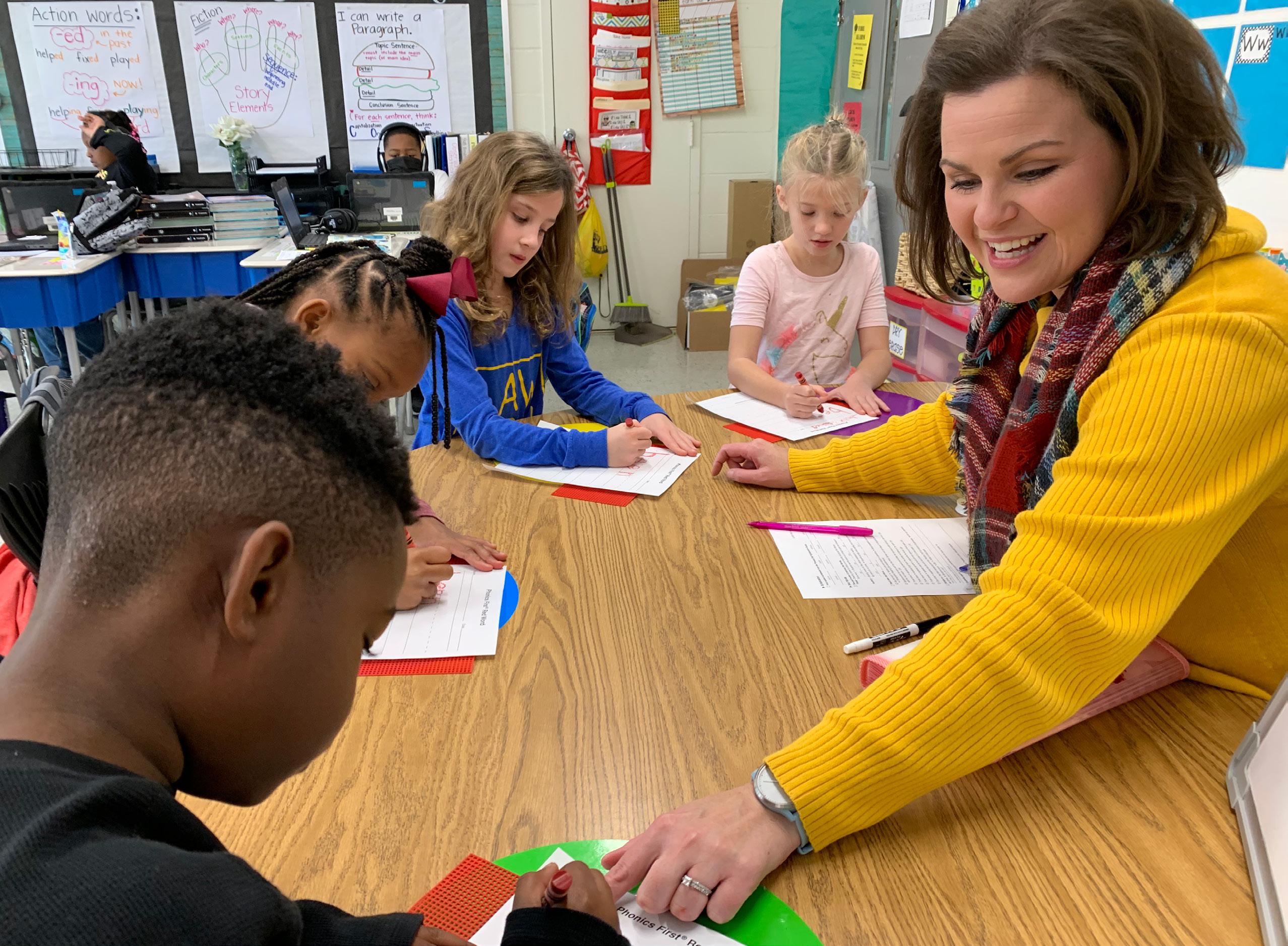
Smith
Leslie Tally, the 2021 Mississippi Teacher of the Year (MTOY), prepares her students to become lifelong learners by helping develop their most essential skill: reading.
Tally, a second grade teacher at Tupelo
Public School District’s (TPSD’s) Lawhon Elementary School (LES), specializes in assisting students with dyslexia and other learning impediments in building confidence through non-traditional methods, including multisensory approaches. In her classroom, students of all abilities can be found each day spelling words in sand, tapping out syllables and using raised, bumpy implements as they
trace over letters with their fingers.
When students unlock barriers to literacy, Tally said she sees them develop confidence, and this newfound confidence helps them take on future challenges and allows them to become the lifelong learners they deserve to be.
“Reading is centered in that core philosophy [of lifelong learning] because
everything that you do as a reader propels you throughout your life. I want my students to understand the skills they’re learning right now influence where they can go after this and how far they go in life,” Tally said. “My goal for working with children, especially those who have learning deficits and don’t necessarily have the confidence they may need, is to have them ready to be able to do the things they would ultimately like to do.”
Tally began teaching 11 years ago after growing up in a family filled with teachers, including her father, a 47-year veteran educator. Her stints include teaching first, second and third grades for TPSD and the Lee County School District (LCSD).
“I always knew I would be a teacher,” she said. “It was just kind of a family profession — the most natural calling and natural path for me.”
For four years at LCSD, Tally taught a class customized for children with dyslexic tendencies, where she worked specifically to provide interventions to students who were weaker readers. Those interventions included intense, explicit, daily instruction and phonics skill-building exercises to help support fluency and comprehension.
That experience further developed Tally’s passion for assisting those who struggle with reading. She became interested in the Orton-Gillingham teaching style and was trained through the Institute for Multi-Sensory Education. This teaching style uses multisensory experiences to enrich learning — combining tactile feeling, sound, sight and smell together, for example, to enhance the reception of new skills and imprint them stronger for better long-term retention. This methodology, along with consistent review through daily drills, benefits all learners, Tally said, no matter their strengths or weaknesses.
“It’s wonderful for all students because it’s usually a more enjoyable learning experience,” she said. “Any time I can employ [multisensory activities] into my classroom instruction, whether it’s specifically through phonics or any other area of literacy, I try to do so because I know how much it enhances the learning process.”
LES Principal Ian Shumpert described Tally as a committed educator who is “always researching and always looking
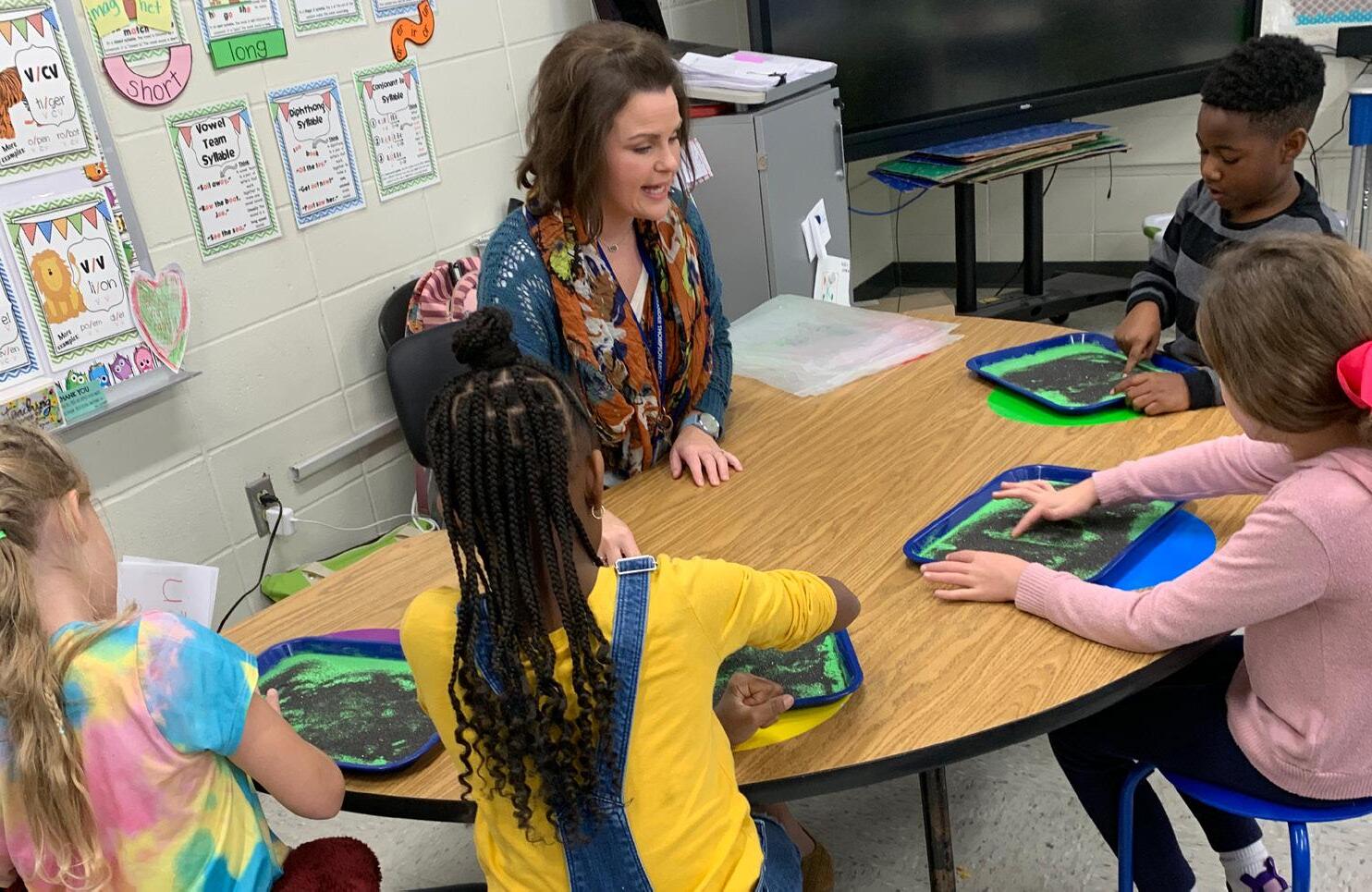
Above: Students draw letters and shapes in trays filled with sand in Tally’s classroom. Adding tactile sensory experiences to reading exercises helps students understand information faster and retain knowledge longer. Opposite page: Lawhon Elementary second graders (from left to right) Evan Lanier, Annie Daher, Julie Sloan and Alana Perry work with Leslie Tally, the 2021 Mississippi Teacher of the Year. Tally uses Orton-Gillingham-based multisensory techniques in her classroom to develop language-based skills, including sight word retention and lettersound correspondences.
for the next best thing to do to try and serve and help children.”
“It’s just ridiculous how phenomenal this young lady is,” he said.
“I hired [Tally] when I first stepped on campus. You could tell then that teaching was more than a career for her; teaching is a calling for her, and I saw that right away. Some people interview well, but you could hear it [in Tally’s voice]. We didn’t want to stop talking to her during the interview; it was nothing like I’ve ever seen before in my life,” Shumpert added. “She’s phenomenal with students of all diversities, whether it’s a student with at-risk issues or a student that’s going to make the highest marks on tests the rest of their lives. She can reach them all; she can push them all; she’ll meet them where they are.”
Winning the 2021 MTOY award was a surreal experience, Tally said, even after earning numerous distinctions and awards for her teaching and service throughout the years at LCSD and TPSD. The award ceremony was conducted virtually, and Tally was able to share the experience at home with her family.
Besides recognizing exemplary teachers who inspire students,
demonstrate leadership both in and out of the classroom and serve as active members of their community, the annual MTOY award also gives recipients a $5,000 stipend and provides them an avenue to share their expertise with other educators in the state.
“[My platform spotlights] the importance of literacy, research-based practices and making sure we’re aligned to the science in the way that we teach,” said Tally, who is expected to finish a dyslexia specialist certification this spring. “I’m just so excited to have that chapter under my belt and continue to share what I learn while I continue to learn.
“Not everyone has an opportunity to learn through [my specific experiences], so I try to compile those things I know specifically are helpful to me in the classroom and share those with other teachers,” she added. “Being able to influence others outside of the classroom has probably been one of the things I’m the proudest of. The more I can help other teachers, the more I can help students — it’s kind of that big-picture mentality but with little, little pieces at a time.”

The U.S. Department of Education recognized four Mississippi schools among the 325 National Blue Ribbon Schools for 2021. The recognition is based on a school’s overall academic performance or progress in closing achievement gaps among student subgroups.
The recognized schools are Woolmarket Elementary School (Harrison County School District), Brandon Elementary School (Rankin County School District), East Hancock Elementary School (Hancock County School District) and Della Davidson Elementary
School (Oxford School District).
“National Blue Ribbon schools are models of consistent excellence in teaching and learning, and these schools represent the high-quality education that takes place across Mississippi’s public schools,” said Dr. Carey Wright, the state superintendent of education.
“I congratulate every teacher, school leader, student and family member who helped their school achieve this outstanding accomplishment.”
The coveted National Blue Ribbon Schools award affirms the hard work of educators, families and communities in creating safe and
welcoming schools where students master challenging and engaging content. Now in its 39th year, the National Blue Ribbon Schools Program has bestowed approximately 10,000 awards to more than 9,000 schools.
The U.S. Department of Education recognizes all schools in one of two performance categories, based on all student scores, subgroup student scores and graduation rates: Exemplary high-performing schools are among their state’s highest performing schools as measured by state assessments or nationally normed tests, and exemplary achievement gap-closing schools are
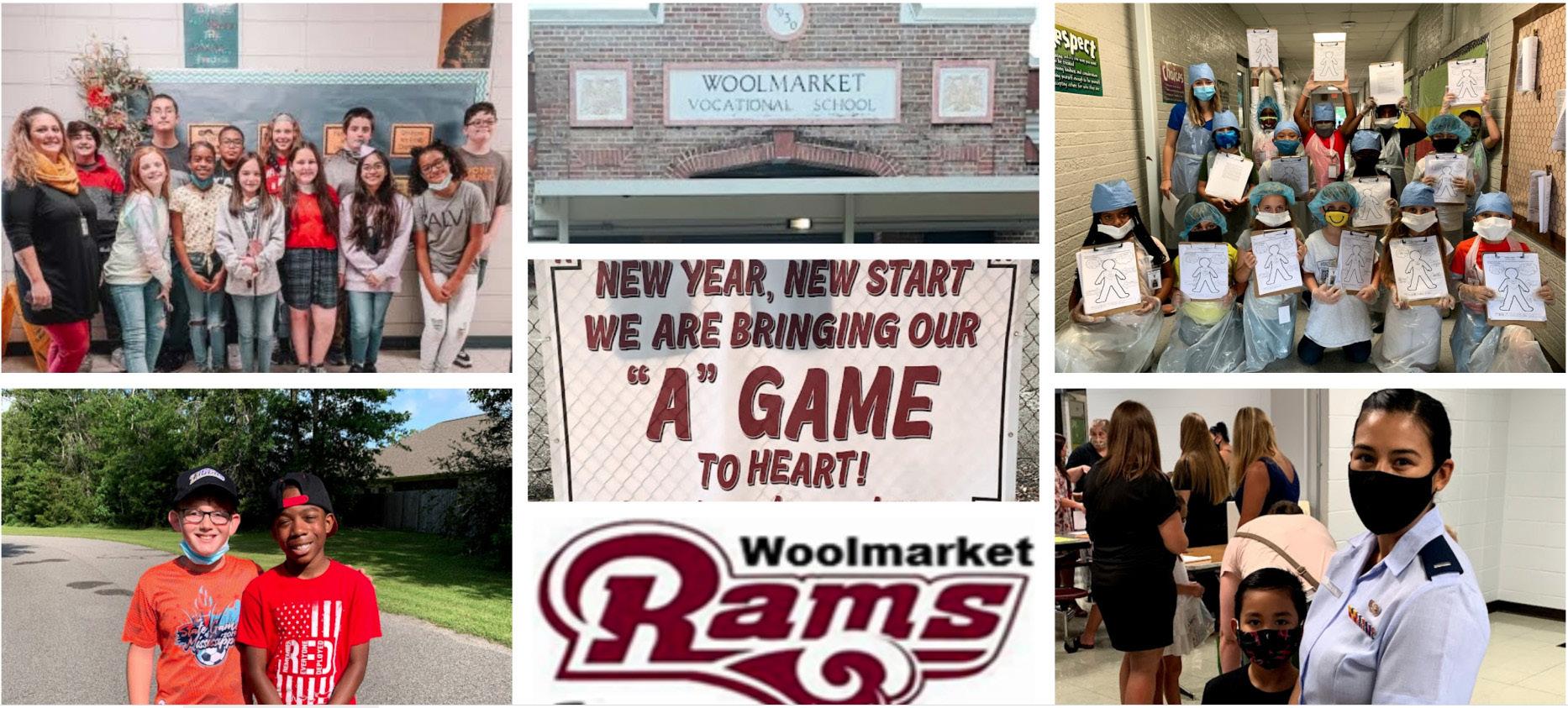
among their state’s highest performing schools in closing achievement gaps between a school’s student groups and all students.
East Hancock Elementary School and Della Davidson Elementary School were recognized as exemplary high-performing schools. Woolmarket Elementary School and Brandon Elementary School were recognized as exemplary achievement gapclosing schools.
U.S. Secretary of Education Miguel Cardona commended the 2021 National Blue Ribbon Schools for working to keep students healthy and safe while meeting their academic, social, emotional and mental health needs.
“This year’s cohort of honorees demonstrates what is possible when committed educators and school leaders create vibrant, welcoming, and affirming school cultures where rich teaching and learning can flourish,” Cardona said. “In the face of
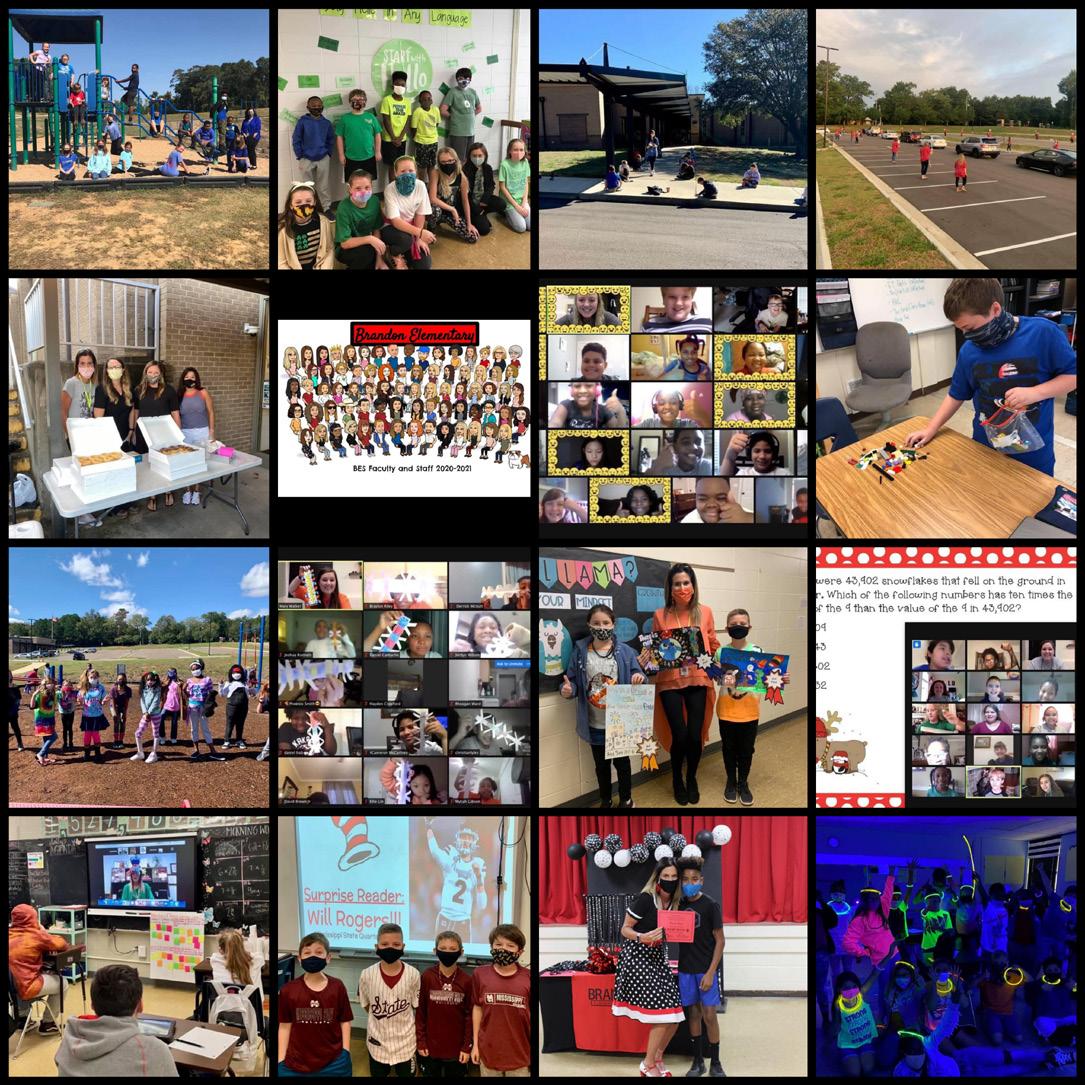
unprecedented circumstances, you found creative ways to engage, care for, protect and teach our children.”
Up to 420 schools may be nominated each year. The department invites nominations from the top education official in all states, the District of Columbia, Puerto Rico, the Virgin Islands, the Department of Defense Education Activity and the Bureau of Indian Education. The Council for American Private Education nominates private schools.
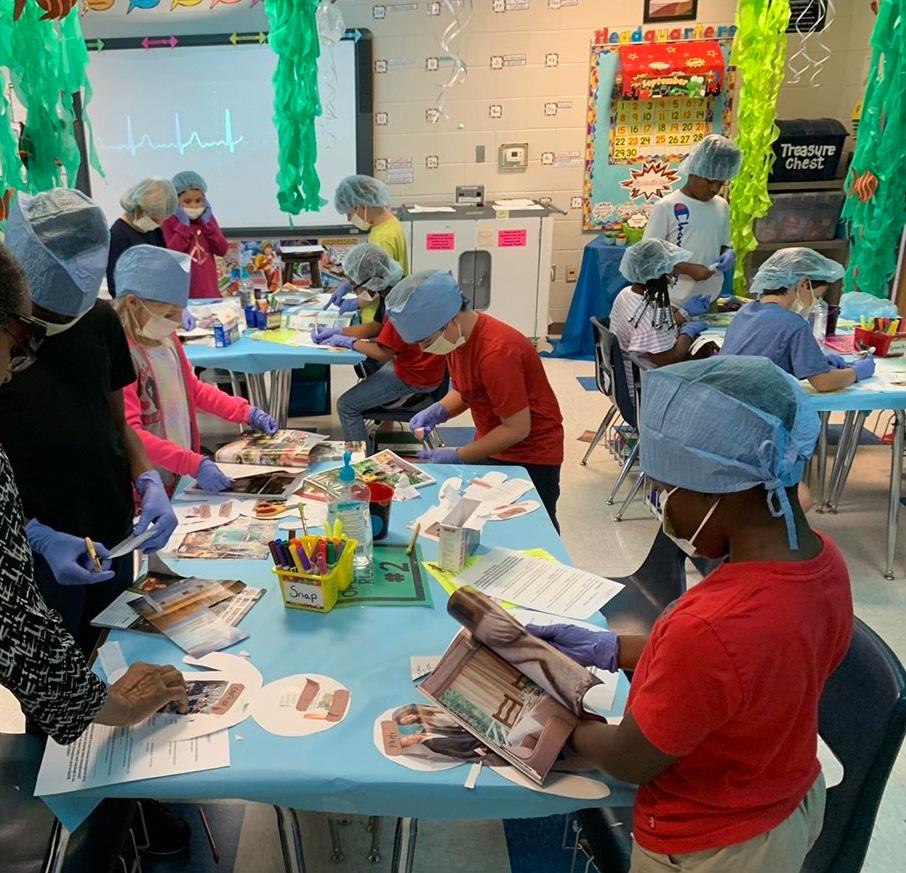
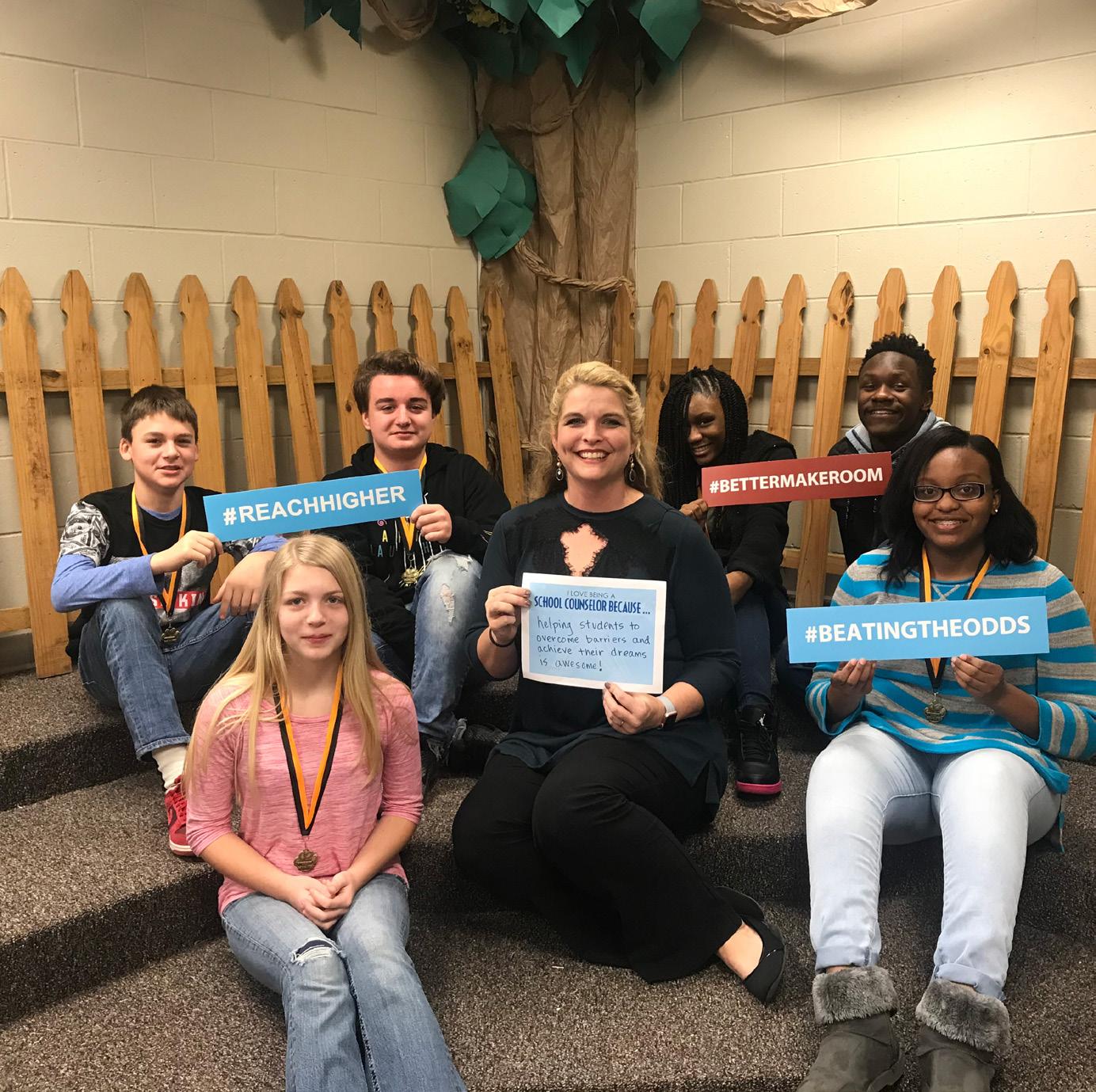
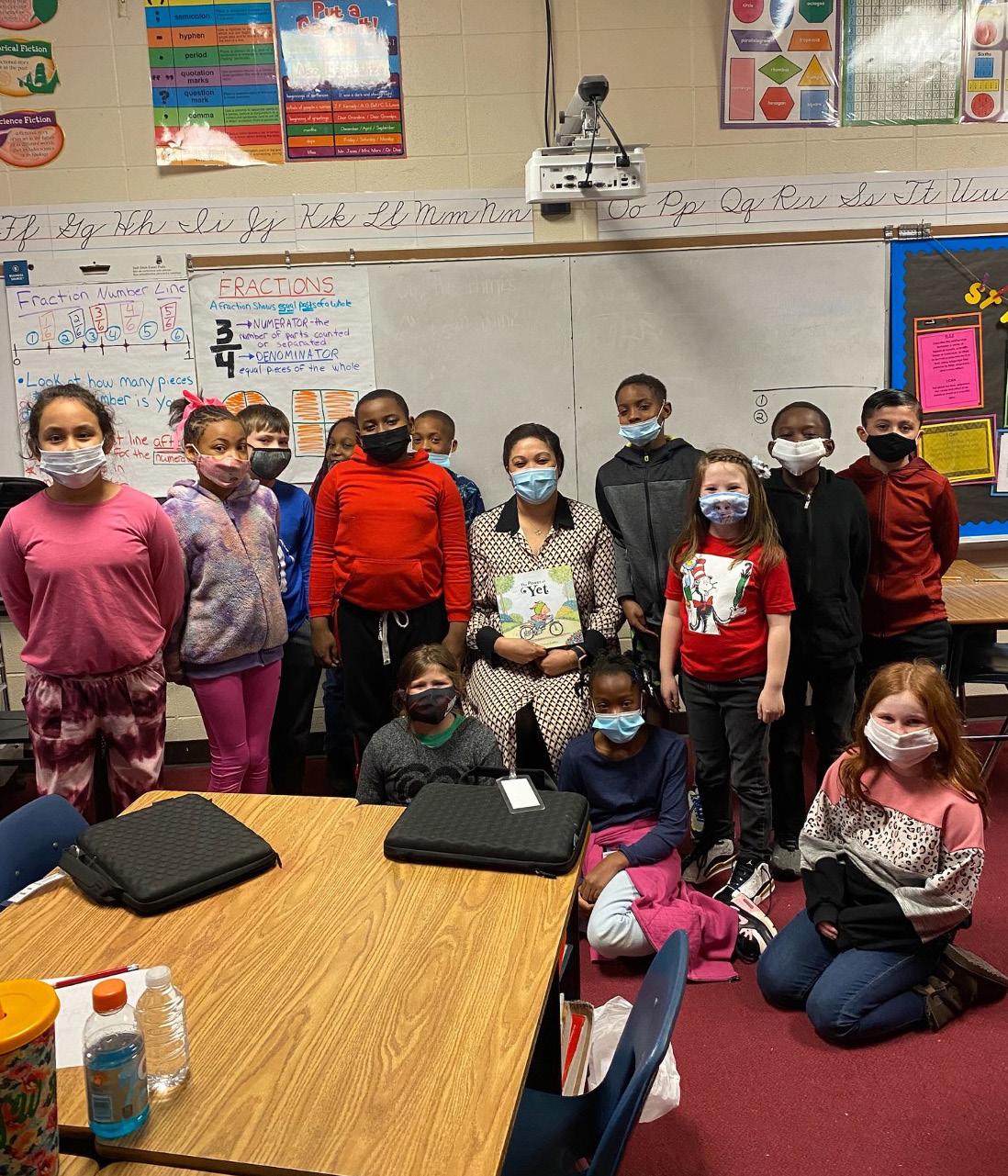
Brock Turnipseed
The job of the modern school counselor looks a lot different than the role of the guidance counselor of yesteryear.
As student needs have grown, the role of counselors evolved to be more proactive, data-driven and focused on students’ academic, social, emotional and college- and career-readiness needs.
Crystal Brewer, who is in her 21st year as the school counselor at Simpson Central School in the Simpson County School District, said Mississippi is shifting the view of counselors in addressing students’ needs.
“We’re making progress to being more proactive in what we do, being more focused on the emotional needs of our students and getting them ready for college and career,” Brewer said. “We want the child to be
successful in all realms of their life.”
Students’ social and emotional needs have been a priority for counselors, but they have become even more critical with the challenges presented by the COVID-19 pandemic.
Dr. Ebonee Magee-Dorsey, a ninthyear school counselor for Lawrence County School District’s Monticello Elementary and Rod Paige Middle schools, said she emphasizes her students’ social and emotional well-
being because it can directly impact their success in the classroom.
“They’re not going to hear anything the teacher says if they come to school with a laundry list of things that happened at home, if they’re hungry, if their boyfriend or girlfriend broke up with them or something happened on Snapchat is bothering them,” Magee-Dorsey said. “I can’t talk to a child about a career or academics unless they are well mentally.”
Dr. Chancey Fort, the Mississippi Department of Education (MDE) director of K-12 academic counseling programs and support services, said there is a great need for school counselors to help students cope with these daily challenges and those brought to the forefront by the COVID-19 pandemic.
member or friend to COVID-19; parents might have gotten divorced or lost jobs — all of those things have changed their environment.”
Fort, a former school counselor
than just the academic well-being of students and can be an integral ally for administrators and teachers.
“We’re making progress to being more proactive in what we do, being more focused on the emotional needs of our students and getting them ready for college and career. We want the child to be successful in all realms of their life.”
- Crystal Brewer, Simpson Central School Counselor
“This pandemic is part of trauma, she said. “Students might be dealing with grief from losing a family
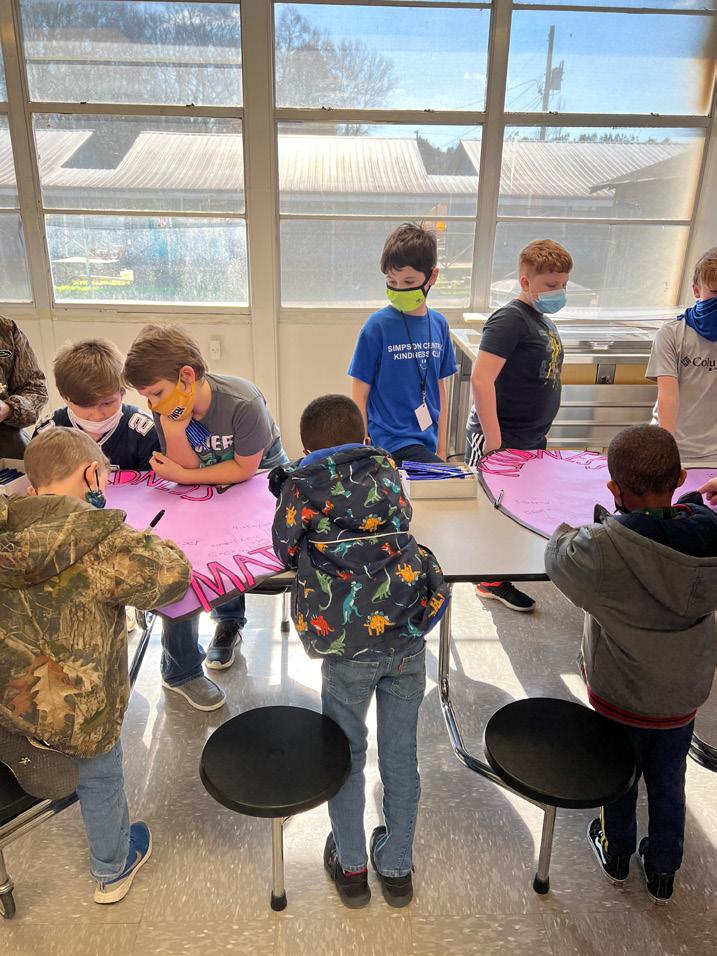
in the Kosciusko School District, has been in her role at MDE for just over a year. She is an advocate for changing the perception of the school counselor from the guidance counselor to a comprehensive school counselor who focuses on more
“Dr. Fort has really tried to put that spark back in school counseling and say, ‘Hey, these are the things that we need to be doing,’” Magee-Dorsey said. “Our license right now says guidance counselor, and she’s trying to get that changed to school counselor. She is starting there then working down to superintendents and principals, letting them know our role. That is when we will start to see some major changes. She has been working very hard for school counselors to make sure we have everything we need and are respected in our field.”
Fort implemented professional development opportunities, resources and supports centered around the American School Counselor Association (ASCA) National Model,
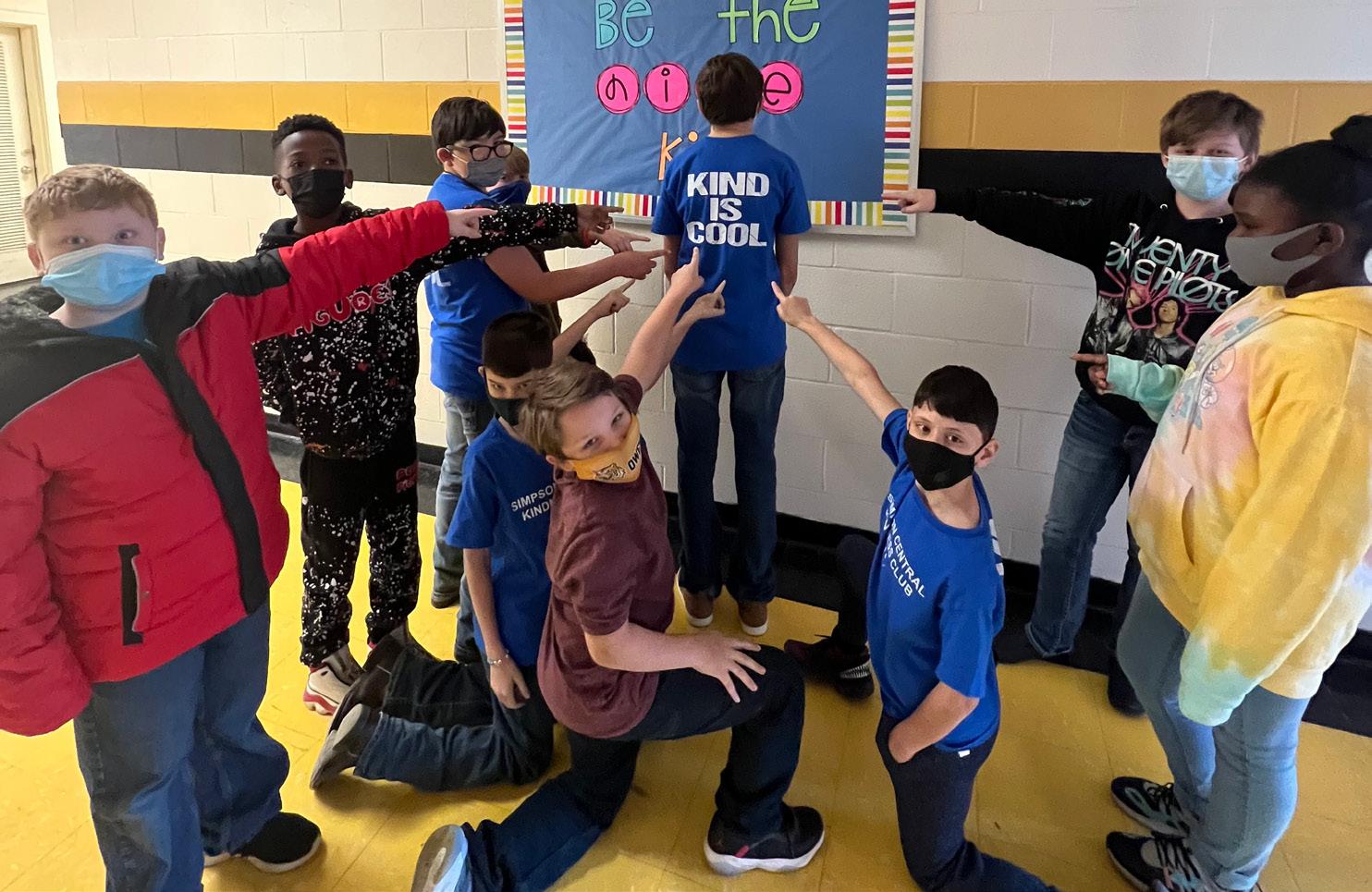
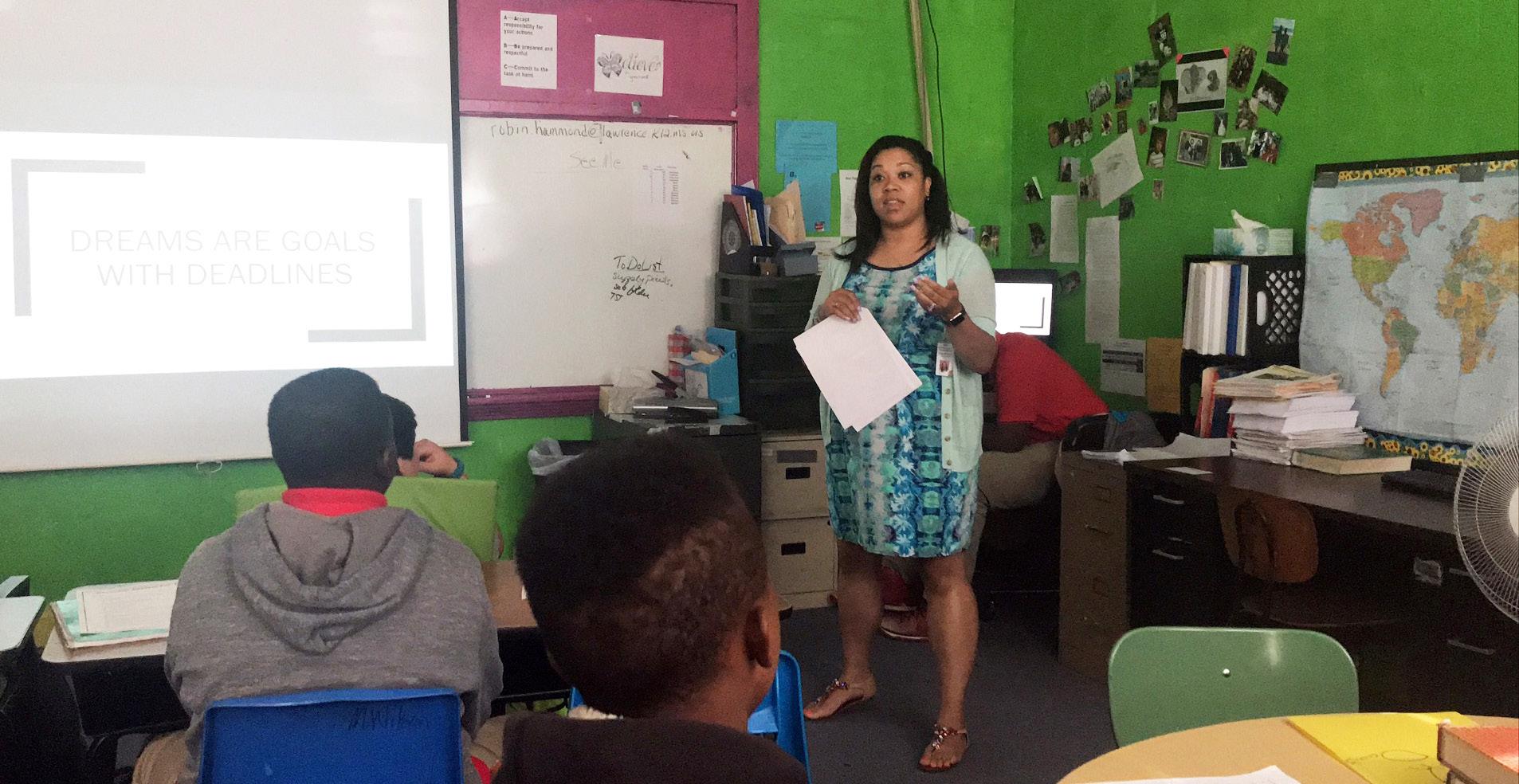
eight grade students about setting SMART — Specific, Measurable, Achievable, Relevant and Time-bound — goals.
“It’s so important that counselors address those social, emotional and mental needs to help make sure (students) can be successful. We want to increase student achievement and test scores, so we have to make sure counselors are able to provide their services to help students be successful.”
- Dr. Chancey Fort, MDE director of K-12 academic counseling programs and support services
a comprehensive framework for school counselors to use in delivering a focused, data-driven, proactive program that addresses students’ needs, including academic, social and emotional and college and career readiness.
She said the state would also recognize a counselor of the year for the first time, and she has plans to implement a statewide mentorship program to guide new counselors in addition to a summer training she holds for those new to school counseling.
Brewer and Magee-Dorsey encourage new school counselors to join professional organizations that provide networking opportunities and suggestions on better advocating for their importance in the school’s support system.
“(Professional organizations) are important for continual growth. They also give us a collective voice
to be able to say, ‘These are the things that matter,’” Brewer said. “Many of us are the only school counselors in our buildings, so (these organizations) give you that collective voice to advocate for the things that are important for school counselors.”
Fort said advocating for school counselors is critical in a time when students’ social, emotional and mental health is vital to their classroom success.
“It’s so important that counselors address those social, emotional and mental needs to help make sure (students) can be successful,” Fort said. “We want to increase student achievement and test scores, so we have to make sure counselors are able to provide their services to help students be successful.”
The U.S. Department of Education (USDE) announced the approval of Mississippi’s American Rescue Plan Elementary and Secondary School Emergency Relief (ARP ESSER) plan in December and distributed remaining ARP ESSER funds to the state.
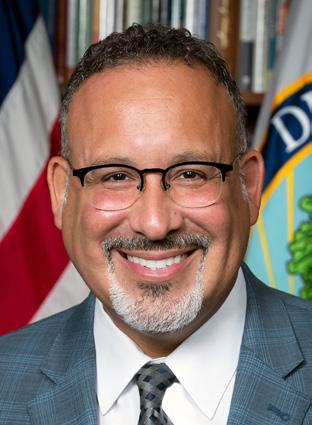
Mississippi’s plan details how the state is using and plans to use ARP ESSER funds to sustain the safe operation of schools and equitably expand opportunities for students who need it most, particularly those most impacted by the COVID-19 pandemic.
Last year, the department distributed two-thirds of the ARP ESSER funds, totaling $81 billion, to 50 states, Puerto Rico and the District of Columbia. The remaining third of the funding to states will be made available once state plans are approved. Mississippi is receiving more than $1.6 billion in ARP ESSER funds, and the approval of the state’s plan will result in the release of the final $543 million. December’s approvals mean a total of 51 ARP ESSER state plans have been approved since June.
Dr. Cardona
pandemic. The state plans that have been submitted to the department lay the groundwork for the ways in which an unprecedented infusion of federal resources will be used to address the urgent needs of America’s children and build back better.”
“Mississippi has prioritized in-person learning because it is the most effective way to keep students engaged, accelerate learning and address their social and emotional learning needs,” said Dr. Carey Wright, Mississippi’s state superintendent of education. “We
by the USDE, including Mississippi’s, show how states are using federal pandemic resources to support safe inperson instruction and meet the social, emotional, mental health and academic needs of students — with a focus on the students most impacted by the pandemic.
For example: The Mississippi Department of Education (MDE) has encouraged districts to consider how to host vaccination drives on school campuses, in addition to sharing Centers for Disease Control and Prevention recommendations and guidance on safe in-person instruction with schools and districts in the state. Mississippi schools have also utilized various strategies to increase vaccination rates in the schools and communities.
“I am excited to announce approval of Mississippi’s plan,” said U.S. Secretary of Education Miguel Cardona. “It is heartening to see, reflected in these state plans, the ways in which states are thinking deeply about how to use American Rescue Plan funds to continue to provide critical support to schools and communities. The approval of these plans enables states to receive vital, additional American Rescue Plan funds to help keep schools open for fulltime, in-person learning; meet students’ academic, social, emotional, and mental health needs; and address disparities in access to educational opportunity that were exacerbated by the coronavirus
“Mississippi has prioritized in-person learning because it is the most effective way to keep students engaged, accelerate learning and address their social and emotional learning needs. We are grateful to the U.S. Department of Education for its significant investment of ESSER funds in Mississippi. These funds will enable our schools to innovate learning and build strong and enduring systems of support to meet the current and future needs of our students.”
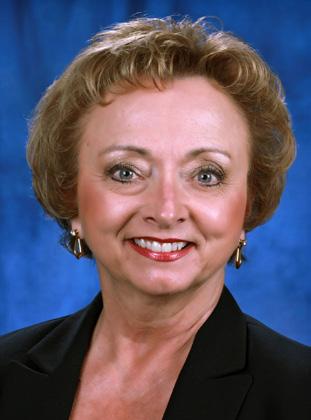
The MDE will use ARP ESSER funds to support high-dosage tutoring, summer learning and enrichment, and extended day programs through a competitive grant program to address students’ academic, social, emotional and mental health needs that the state is developing.
- Dr. Carey Wright, state superintendent of education
are grateful to the U.S. Department of Education for its significant investment of ESSER funds in Mississippi. These funds will enable our schools to innovate learning and build strong and enduring systems of support to meet the current and future needs of our students.”
The ARP ESSER state plans approved
The MDE has launched a behavioral telehealth project in response to mental health concerns that may have been exacerbated by the pandemic, staffed by school staff. The MDE is also using ARP funds for a pilot program to deliver mental and behavioral health care to children and increase educator knowledge about behavioral management techniques. Additionally, the MDE has awarded funds to put 25 new medical staff on site in schools.
The distribution of ARP ESSER funds is part of the USDE’s broader effort to support students and districts as they work to reengage students impacted by the pandemic, address inequities exacerbated by COVID-19 and build our education system back better than before.
Heather Tucker
This school year, the Mississippi Department of Education (MDE) began recognizing schools across the state that use literacy strategies based in the science of reading methodology. The fall celebrations of Science of Reading schools marked the importance of the state’s continued efforts to incorporate research that cognitive and linguistic scientists have long demonstrated effectively teach children how to read.
So far, Falkner Elementary (North Tippah School District), Franklin Academy (Columbus Municipal School District), Magnolia Park Elementary (Ocean Springs School District), Poplarville Lower Elementary (Poplarville School District), Purvis Lower Elementary (Lamar County School District), Tate County Elementary (Tate County School District) and Henderson Ward Stewart Elementary (Starkville Oktibbeha School District) have all been named
Science of Reading schools by the MDE for their use of research-based methods to help all students learn to read.
“Mississippi has become a national leader in literacy because our children have made more progress in reading in recent years than any other state,” said Dr. Carey Wright, the state superintendent of education. “Mississippi educators have committed
Mississippi implemented strategies that were researched by BRI since 2000 to great success.
“Reading is an education and economic issue. Children who are not reading proficiently in third grade are four times more likely to not graduate high school.”
- Kristen Wynn, state literacy director
themselves to providing instruction aligned to the science of reading so students can build the literacy skills they need to succeed throughout their education.”
Data corroborates Wright’s assertion; Barksdale Reading Institute (BRI) Chief Executive Officer Kelly Butler said
“Mississippi took the top-down approach, providing $15 million from the legislature to ensure every school received a single-format professional development and coaching model that, once implemented on the local level, lifted the state off the bottom. Every school had to use methods based in literacy and cognitive research,” Butler said. “Within 18 months, kids were reading. It has made Mississippi a place to watch. We were the only state to show growth during the first year of using this methodology statewide.” It is estimated about 50% of students can learn to read using any method of teaching, but the other half need science-based, research-proven methods to become successful readers. The science behind teaching children to read has increasingly moved to the forefront nationally, so MDE administrators began recognizing schools for being Science of Reading schools this year after they began offering a variety of
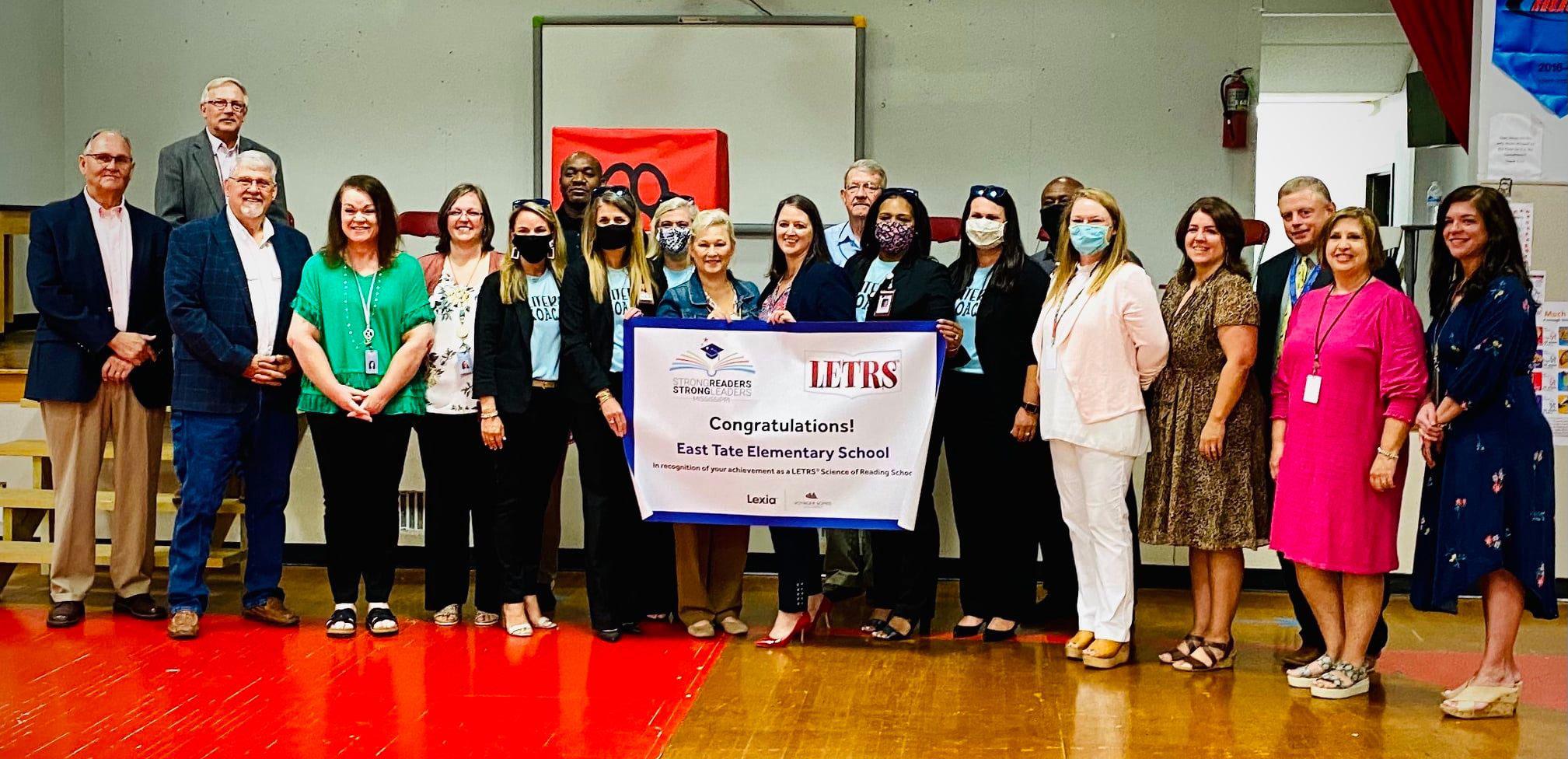
training opportunities to educators and schools to help them incorporate the body of Science of Reading knowledge into their own practices.
“We offer training free to Mississippi educators grounded in the Science of Reading called Language Essentials for Teaching Reading and Spelling (LETRS) Training. Initially, we began offering this training to educators in the spring of 2014, shortly after the passing of our early literacy policy, the Literacy-Based Promotion Act,” said Kristen Wynn, the state literacy director at the MDE Office of Elementary Education and Reading.
The primary goal of incorporating scientific strategies into reading education is to improve students’ job prospects upon graduation, which in turn helps Mississippi’s economy. Research proves early literacy indicators can predict whether a student will be successfully employed at a high-skill, high-wage job as an adult.
“Reading is an education and economic issue. Children who are not reading proficiently in third grade are
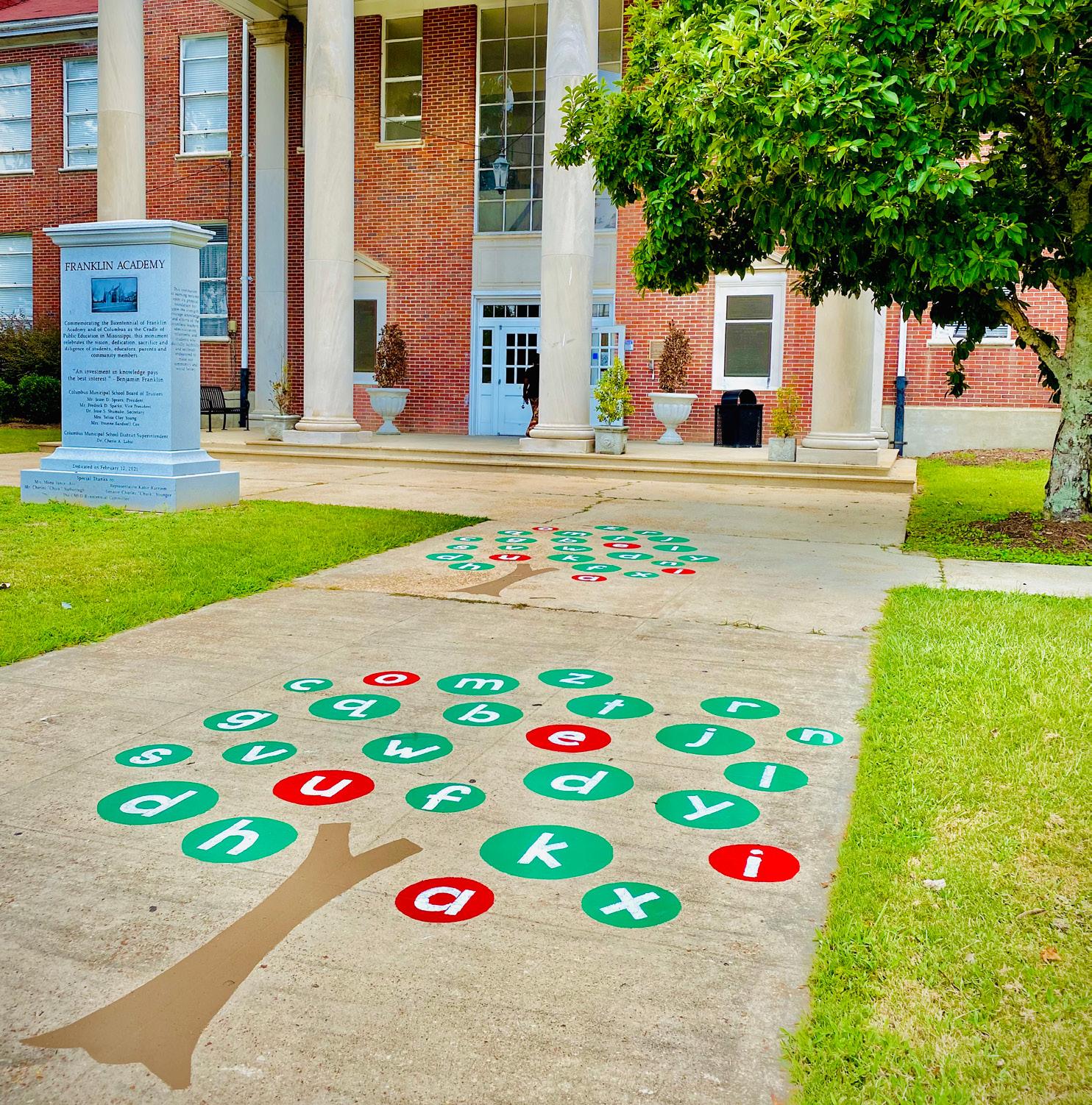
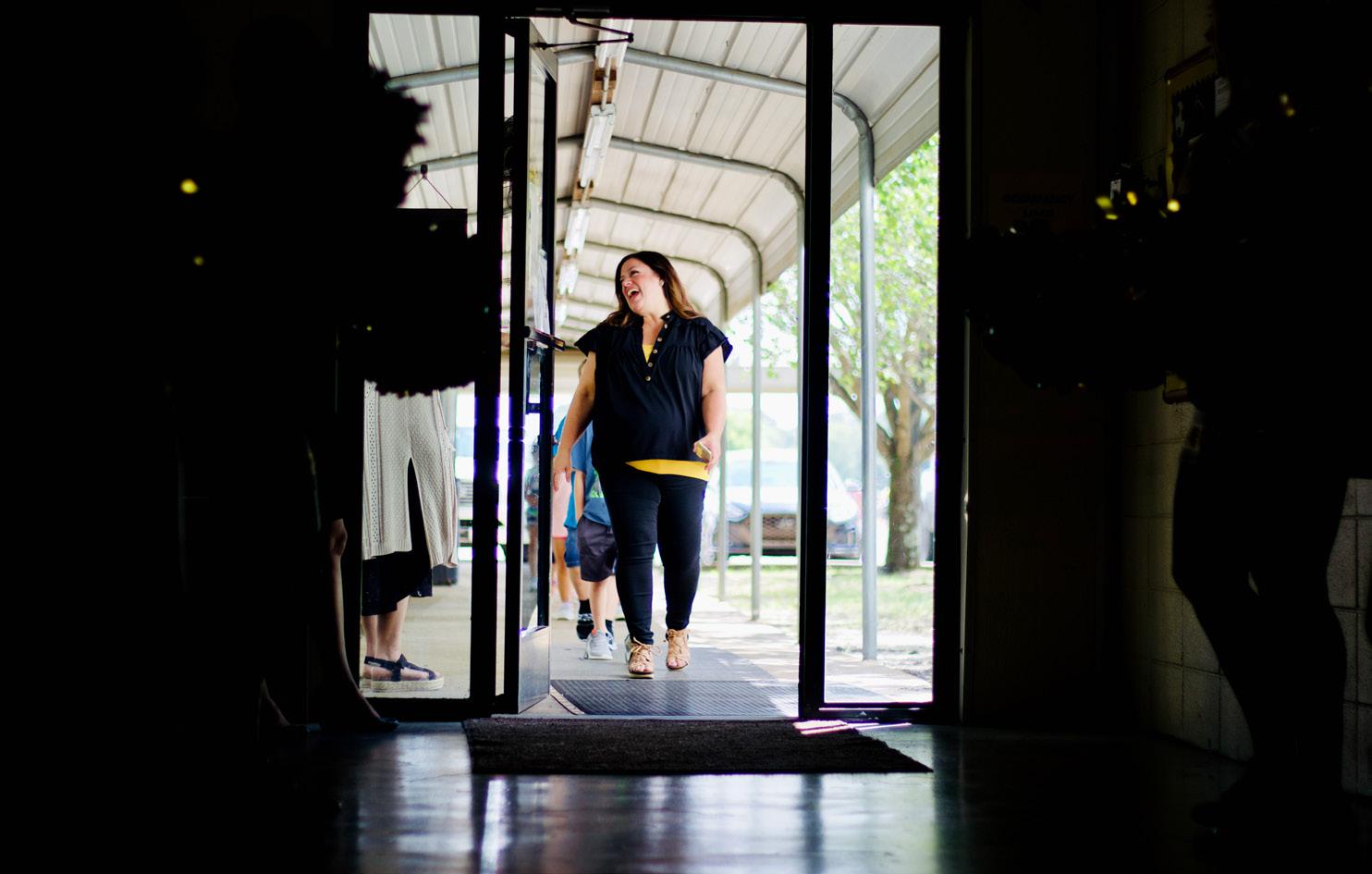
For additional information, Barksdale Reading Institute Chief Executive Officer Kelly Butler recommends these resources for further information on the methodology:
Hard Words: Why aren’t kids being taught to read?
https://www.apmreports.org/episode/2018/09/10/hard-words-whyamerican-kids-arent-being-taught-to-read
What the Words Say (Educate Podcast episode)
https://podcasts.apple.com/us/podcast/what-the-words-say/ id81914987?i=1000487274272
The Perfect Storm: Mississippi’s Momentum for Improving Reading Achievement
https://excelined.org/2020/09/01/the-reading-league-journal-the-perfectstorm-mississippis-momentum-for-improving-reading-achievement/ There is a Right Way to Teach
Reading and Mississippi Knows It
https://www.nytimes.com/2019/12/05/opinion/mississippi-schools-naep.html
four times more likely to not graduate high school,” Wynn said.
These missed opportunities devastatingly affect Mississippi’s minority populations: “African American and Hispanic students who are not reading proficiently in third grade are six times more likely to drop out of high school. Seven out of every 10 prison inmates can’t read above a fourth-grade level. Economically, high school dropouts are not eligible for 90% of the jobs in the economy, they make up 50% of all heads of households on welfare and, typically, their yearly earnings are more than 50% less than that of someone who earns a bachelor’s degree,” Wynn said.
LETRS training is not MDE’s only plan of attack on Mississippi’s literacy problem. Wynn noted her office also hosts statewide literacy nights to provide resources to families that will help their students improve their reading skills. The office also maintains a website (strongreadersms.com) designed specifically for parents.
“[The website’s suggested activities] can be done at home with common household items,” Wynn said.
The MDE’s efforts also incorporate Mississippi Public Broadcasting’s Classroom TV, which is available over the air to a large percentage of residents.
“[It] features 250 interactive structured literacy lessons for students that are taught by MDE literacy coaches and content-area experts from across the state,” Wynn said.
Butler encourages parents to stay involved with their student’s literacy by asking teachers questions, helping children with phonics and asking teachers for things to do with children at home to encourage continued learning.
School districts and educators interested in LETRS training and becoming a recognized Science of
Reading school can contact MDE’s Office of Early Education and Literacy at 601.359.2586.
Additional resources for educators are available on MDE’s literacy webpage at mdek12.org/literacy.
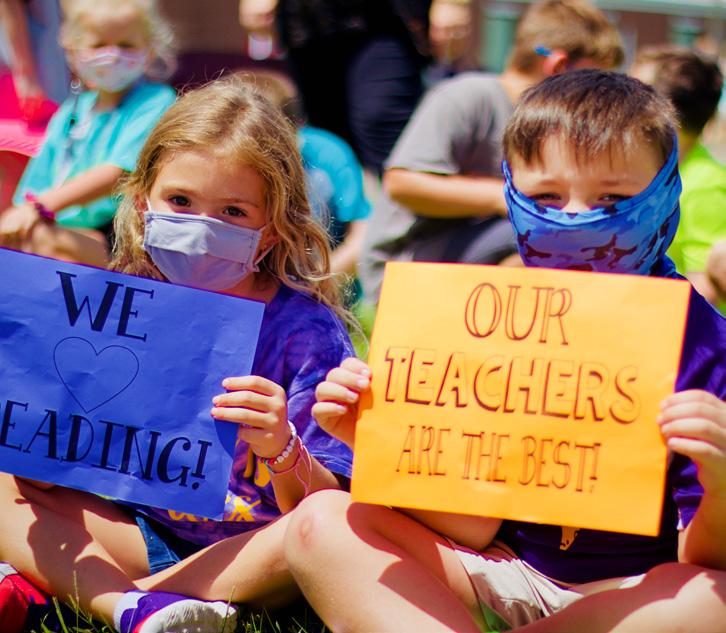
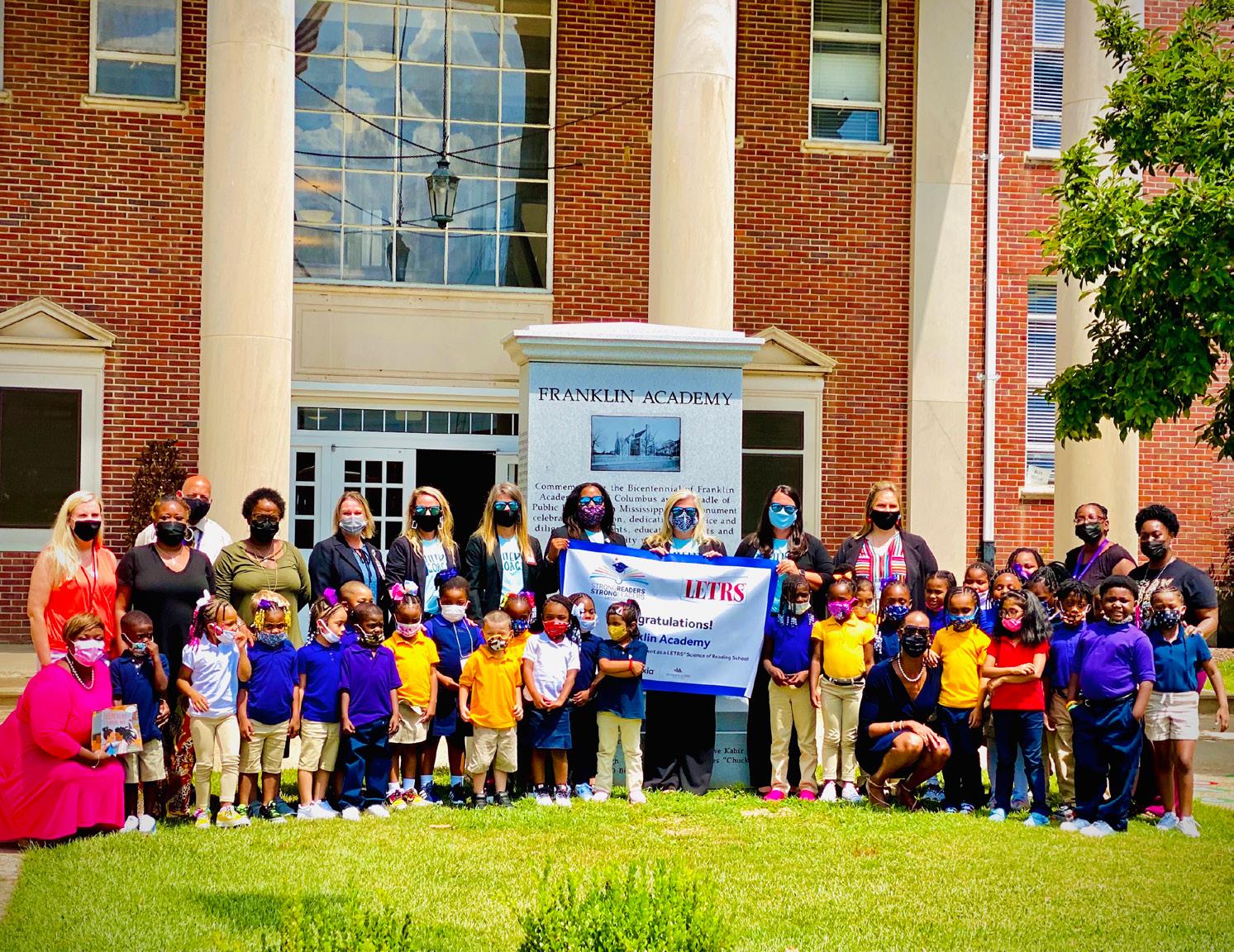
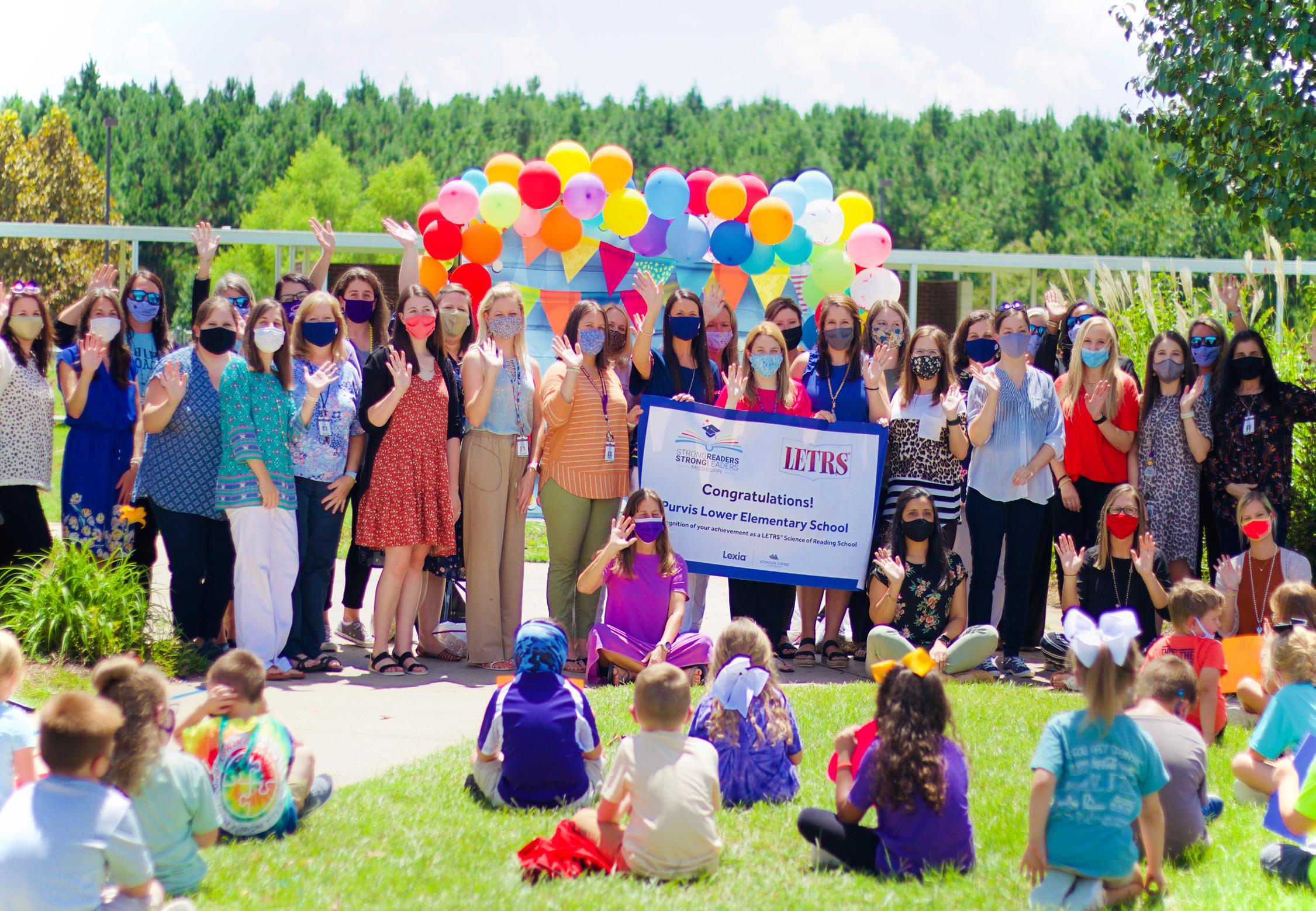
Will Graves
For Aleesha Hudson, the Mississippi Department of Education’s 2021 Parent of the Year, supporting her community helps her improve the place where she was raised.
Hudson — a Hinds County resident, 1998 graduate of Raymond High School (RHS) and the mother of Brandon (ninth grade) and Alison (fifth grade) — was recognized by the department for her involvement in the Hinds County School District (HCSD) and her desire to better her community through the establishment of a community resource foundation and by providing scholarship funds for HCSD students.
“It’s very important for me to support where I can, because I came from Raymond,” Hudson said. “I [live here], and I feel like this area raised and poured into me as an individual, which definitely provided a foundation for me.”
Hudson is a graduate of Jackson State and Belhaven universities, and some of her biggest community projects bring scholarship opportunities to students. She spearheaded two plans to start endowment and scholarship funds and met fundraising goals within one year. After being selected as
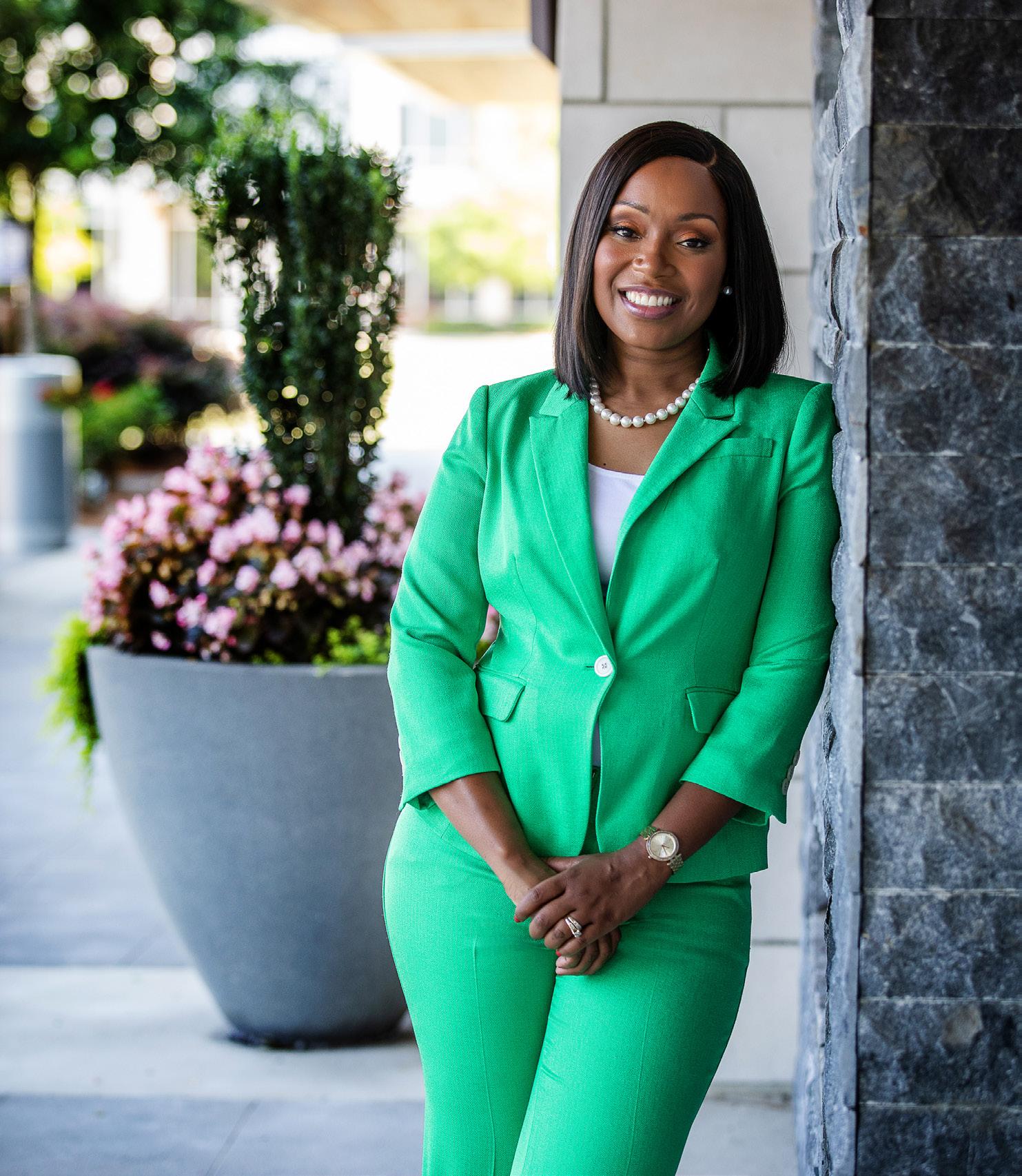
2021 Mississippi Parent of the Year, Hudson’s nonprofit Community Resource Foundation provided $5,000 in scholarships to HCSD students.
The reach of Hudson’s foundation goes far beyond student scholarships — its primary goal is to connect the
rural community with a variety of resources. The foundation hosts workshops and seminars, and it assists with local food drives and giveaways. The organization stepped up during the COVID-19 pandemic to provide masks, hand sanitizer
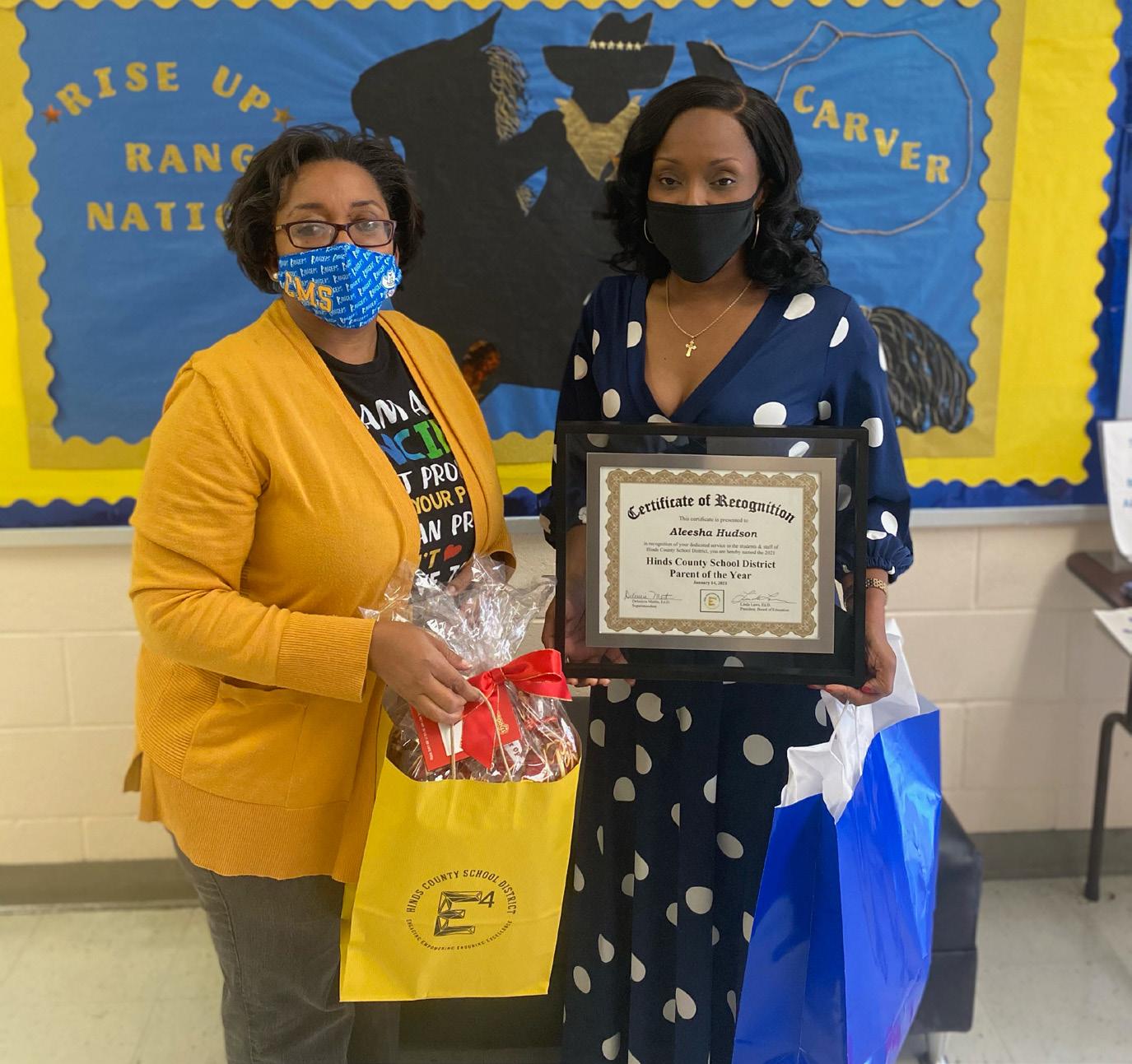
a school supply and bookbag giveaway event.
and other basic needs, and students benefit from backpack and school supply giveaways.
“During the COVID-19 season, a lot of organizations were out providing those resources in the Jackson area,” Hudson said. “When I would ask when organizations would be coming out to rural areas, I was told there was no one to help coordinate those activities in those areas. So, I took that on as my charge to help those larger organizations I may have connections with, to coordinate some of their service activities or projects in rural communities.”
Passion for community helped get Hudson where she is now, and with two children in the HCSD, she knows how important it is to give back to the local schools — because of how vital they are to the community. HCSD Associate Superintendent Dr. John
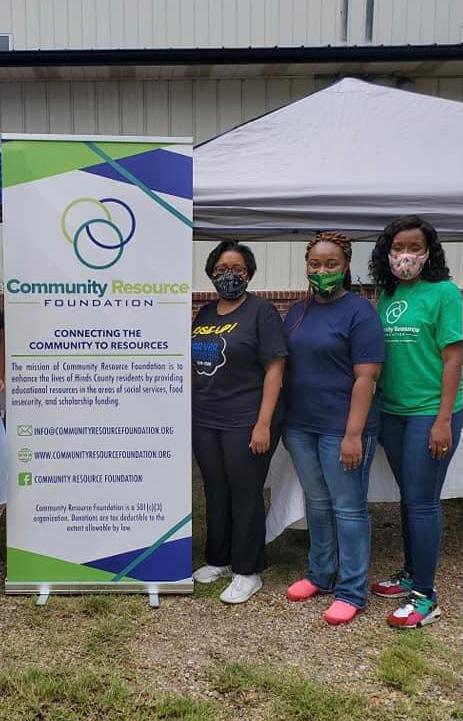
Neal said Hudson’s volunteer service and love of giving back to her school and community go all the way back to her time a student at RHS.
“Hudson has really been trooper for us,” Neal said. “She is the product of the HCSD, and she has always volunteered, even when she was in high school. I think that foundation is what carried over in her life in terms of assisting and supporting for the community. She’s engaging with the students, she attends many school events and she has helped give away school supplies to the entire Jackson metropolitan area.”
Neal said Hudson’s community service and involvement with her children’s school district allowed her the opportunity to serve in the superintendent’s Parent Engagement Network, which keeps her at the heart of community and school outreach.
“Hudson serves on a parent committee that discusses concerns and support that can be provided to our schools, and then they take that information back out into the community to reach all parents. The committee also serves as a vessel that can carry information from the community back to our superintendent,” he said. “It has been an excellent partnership working with Hudson, and it is evident she loves giving back to her community.”
Research shows parental involvement is a vital component of the academic success of students. The MDE’s Parent of the Year program annually recognizes outstanding parents who have significantly impacted improvement efforts in their local school district.
Heather Tucker
This year, the Mississippi Department of Education (MDE) released the Middle School Transition Toolkit, a collection of resources designed to bridge the leaps from elementary to middle school and from middle school to high school.
The toolkit is MDE’s latest effort to offer teachers, counselors, parents and students resources that draw together the roadmaps already available to them, from social emotional learning (SEL) standards to scaffolding and the Access for All Guide 2.0.
life, helping foster success in the middle years of their education. It is divided into five categories, each of which contains several recommended activities to assist with middle school transition:
“Imagine you’re a new administrator trying to get to know staff, students and improve culture. There are activities in there to help you hit the ground running toward success.”
- Dr. Marla Davis, associate superintendent, academic liaison
The document is designed to support students from all walks of
“The toolkit helps everyone follow the same roadmap by pointing them to the same resources and language. This toolkit serves to build a bridge between the islands of elementary, middle and high school,” said Cindy Ming, a Mississippi State University Research and Curriculum Unit project manager who coauthored the toolkit.
MDE officials and contractors from across the state put years of effort into creating superior early elementary and high school resources that prepare students for their next steps by modeling consistent terminology that assists teachers
communication, culture, instruction, family engagement and SEL. Activities range from student-led conferences about academic progress and parent academies to community walks and pass-the-torch meetings. It also offers proven ways of creating a consistent communication plan for school districts and student bodies.
in communicating with students about what they have learned and building on what students have already mastered. The toolkit is the final piece that will bolster students’ transitions through every grade.
“We’ve all heard a teacher or administrator say, ‘They didn’t teach you anything at [the previous grade or school].’ That is not a problem of the previous teacher, administrator or the student. It’s a problem of terminology and communication. That is the thinking we are striving to correct with the toolkit by providing resources to help people at all levels of a student’s education speak the same language and have similar expectations for the student,” Ming said.
Dr. Marla Davis, the state’s associate superintendent, academic liaison, said MDE administrators do not want teachers to see the toolkit as simply “something else and something new.”
“[It] helps teachers connect how all the resources that are already available work together,” she said. “It’s not a directive, but we hope it will be used and we plan to offer plenty of support for those who do.”
All suggestions the toolkit offers are research-based and
proven to help transition students to and from middle school, Ming said, and authors welcome feedback and insights into what works and does not work so the activities and suggestions can remain relevant.
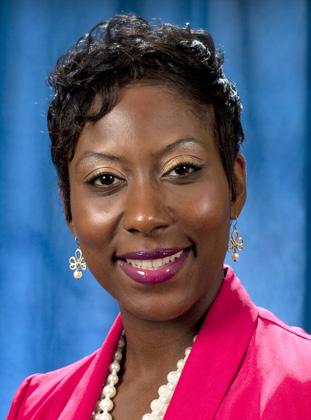
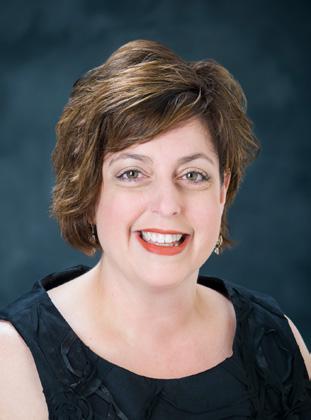
“As part of the review team, we were tasked to vet the strategies and resources that were proposed by the teachers and leaders on the writing team. We were able to offer a few additions based on our work across the country. However, most of the strategies that are in the toolkit come from schools right here in Mississippi,” said Bob Stokes, a Southern Regional Education Board representative who advised MDE during the process of researching appropriate suggestions for the toolkit.
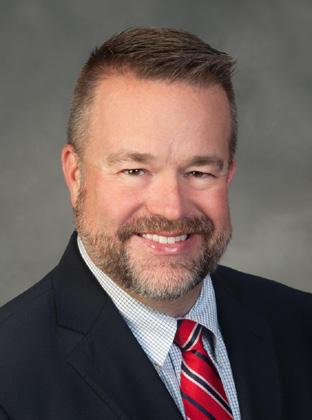
marking the contributors’ school districts and their professional roles.
“It’s not all-inclusive at this point, but it is going to help,” she said. “The toolkit’s users can help us make it more and more helpful to others by sharing with us what works for them.”
Davis is particularly excited that every true middle school in the state will receive a hardbound color copy of the toolkit. These copies were scheduled to arrive at schools this spring. MDE plans to begin in-person training in support of the toolkit’s resources in the coming academic year.
Davis said she wants the toolkit to be a living document and explained that even the acknowledgments page is designed to serve as a map for teachers to reach out to other educators and administrators in the state, as it is formatted with photos
“Imagine you’re a new administrator trying to get to know staff, students and improve culture,” Davis said. “There are activities in there to help you hit the ground running toward success.”
“I see this as building on the success the state has had with elementary grades. This toolkit will support middle schools in similar endeavors,” Stokes added.








The Mississippi Department of Education (MDE) 2020-2021 Superintendent’s Annual Report was released in January and details how Mississippi students, teachers and school leaders continued to strive in classrooms during the COVID-19 pandemic by building upon historic academic gains of recent years.
“Despite some setbacks, Mississippi students, families, teachers and school leaders persevered through the most challenging school year of their lives, and I could not be more proud,” said Dr. Carey Wright, the state superintendent of education. “As we continue to combat the pandemic, plans are underway to offer additional resources to teachers and students and ensure academic gains are achieved.”
View the report online at mdek12.org/superintendent2021
• Graduation rate reached an all-time high of 87%; graduation rate of students with disabilities reached an all-time high of 55.4%, more than double the rate of 23.2% in 2014.
• Dropout rate fell to a historic low of 8.8%.
• Statewide assessments resumed with 97% of students participating.
• The Advanced Placement exam passing rate for 2021 reached an all-time high of 37.4% for a full school year.
• The number of students who completed career and technical education courses of study increased 36% from 2015 to 2021.
• Nearly 400,000 computer devices secured for students through the Mississippi Connects initiative and other funds.
• In partnership with Mississippi Public Broadcasting (MPB), MDE literacy coaches and other certified teachers filmed 260 lessons to pre-K-12th grade students on the MPB Classroom TV channel.
• Class of 2022 graduates can now earn an academic or distinguished academic endorsement to automatically qualify for admission into any of Mississippi’s public universities. Graduates can also earn a career and technical education endorsement.
• Approximately 3,000 students enrolled in 18 Early Learning Collaboratives (ELCs) across the state with plans to enroll 6,000 students in additional ELCs in 2022-2023 now that funding has doubled from $8 million to $16 million.
• A team of 112 coaches supports teachers and school leaders in the areas of literacy, early childhood education, special education, school improvement and digital learning. Math coaches will be added in 2022.
• Three schools exited the Comprehensive Support and Improvement program and four schools were named 2021 National Blue Ribbon Schools.
After a 5o-year career in public education, State Superintendent of Education Dr. Carey Wright announced her retirement effective June 30, 2022.
The Mississippi State Board of Education (SBE) appointed Wright to be the state’s top pre-K-12 education official in 2013. Her tenure in Mississippi has been longer and marked by more student gains than any state superintendent of education since the Education Reform Act of 1982 established the SBE. Nationally, Wright is one of the longest-serving state education chiefs of the 21st century.
Under Wright’s leadership, the state initiated successful education reforms that made Mississippi a national leader in improving student achievement. Mississippi’s Quality Counts grade for education improved from an F to a C-, its ranking climbed from 50th to 35th and the graduation rate rose from 75.5% to 88.4% – higher than the national average. Among students with disabilities, the graduation rate more than doubled from 23.2% to 59.9%. Mississippi fourth graders in 2013 were reading more than one full grade level behind the national average on the National Assessment of Educational Progress (NAEP). By 2019, Mississippi fourth graders scored higher than the nation’s public school average in mathematics, tied the nation in reading and ranked No. 1 in the nation for making the largest score gains. The rapid progress of Mississippi students earned the state Quality Counts’ No. 2 ranking in the nation for improvement in 2019, 2020 and 2021.
“Dr. Wright never wavered from her belief that Mississippi students were just as capable as students in any other state,” said Rosemary Aultman, SBE chair. “She eliminated the culture of low expectations and proved our students could achieve at the highest levels. States throughout the country now turn to Mississippi to learn about our successful strategies for raising student achievement. Dr. Wright’s leadership has improved educational opportunities and outcomes for a generation of Mississippi students.”
A passionate advocate for early childhood education, Wright implemented Mississippi’s first publicly funded Early Learning Collaborative program, which earned the state recognition from the
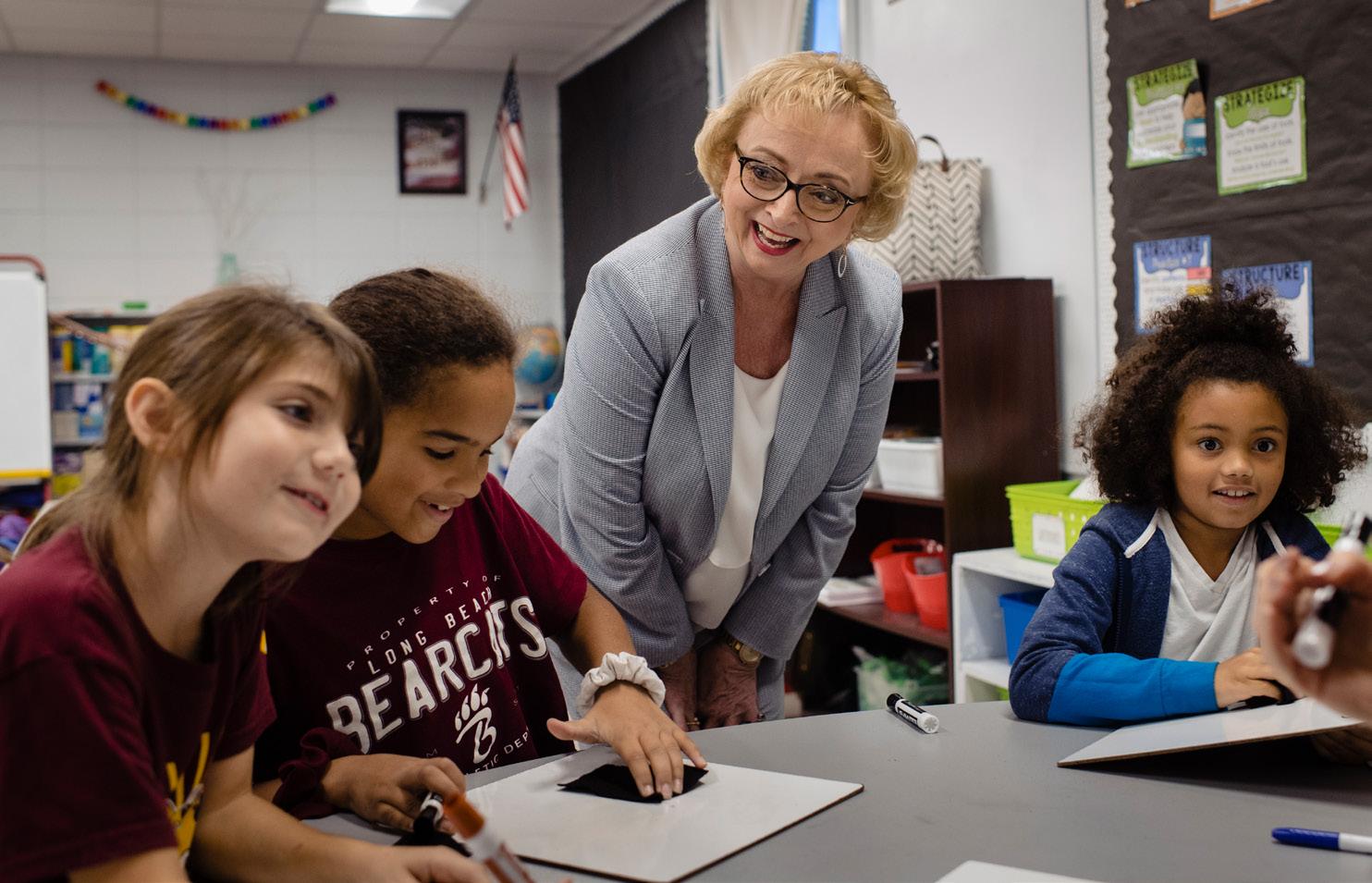
National Institute for Early Education Research as one of only six states in the nation to meet all 10 quality standards for early childhood education. The program has grown from 11 collaboratives serving 1,700 children in 2014 to 30 collaboratives that will serve 6,000 children in 2022-23.
Wright spearheaded initiatives that have increased literacy skills in pre-K through grade 3, pushed student achievement on the NAEP to improve at a faster rate than most other states and nearly doubled the Advancement Placement participation and success rate. Pre-pandemic, Mississippi students achieved significant annual gains in English language arts and mathematics proficiency. Though the pandemic disrupted learning throughout the country, Mississippi’s assessment scores did not fall as much as in other states.
Wright’s most recent innovation includes the Mississippi Connects program, which provided every student in the state with a computer device to learn at school or at home. The program includes enhanced internet connectivity, high-quality digital content, professional development for teachers and administrators, digital learning coaches and the launch of telehealth/teletherapy in schools starting in the 2022-23 school year.
She also implemented the Mississippi
Teacher Residency, which provides scholarships and mentors to aspiring teachers, and the Performance-Based Licensure program, which helps Mississippi teachers with provisional licenses become fully licensed. The next teacher residency cohort will provide graduate degree scholarships for 200 aspiring elementary and special education teachers.
Throughout her tenure as Mississippi’s state education chief, Wright has been an active member and leader of numerous national and state boards and organizations that advance the field of education. Notably, the U.S. Secretary of Education appointed her in 2019 to the National Assessment Governing Board, which sets policy for NAEP, the Nation’s Report Card. In 2022, Wright earned the Mississippi Top 50 Most Influential Leaders Award.
“Leading education in Mississippi has been the honor and privilege of my life. I am deeply grateful for the opportunity I have been given to work with dedicated educators and leaders across Mississippi, the entire Mississippi Department of Education team and committed State Board members and legislative leaders. Together we have worked to make a difference in the lives of children,” Wright said. “Most especially, I am incredibly proud of Mississippi students. There is no limit to what they can accomplish.”
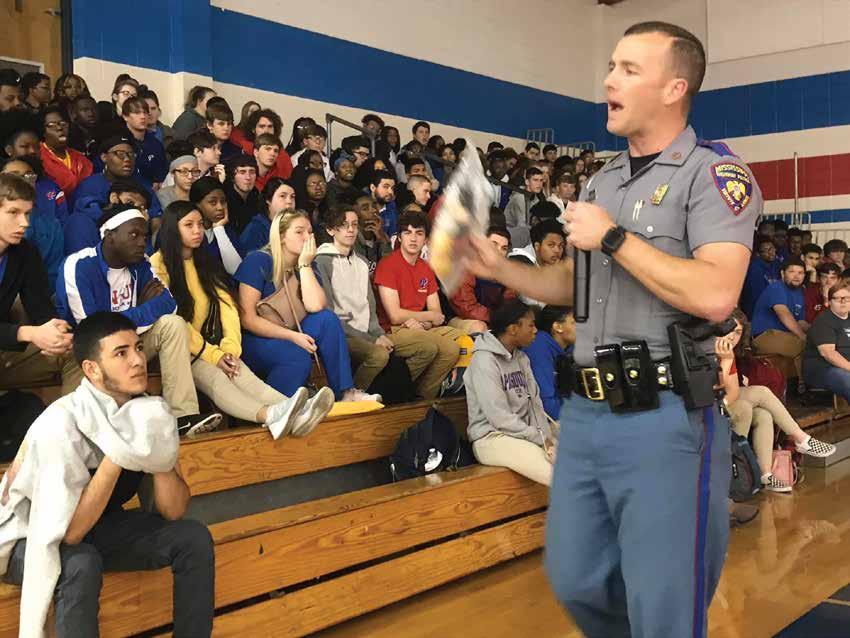
In-person presentations run approximately 1 hour and are scheduled in March, April, May. Slots are limited. (targeted to prom-bound high school juniors and seniors)